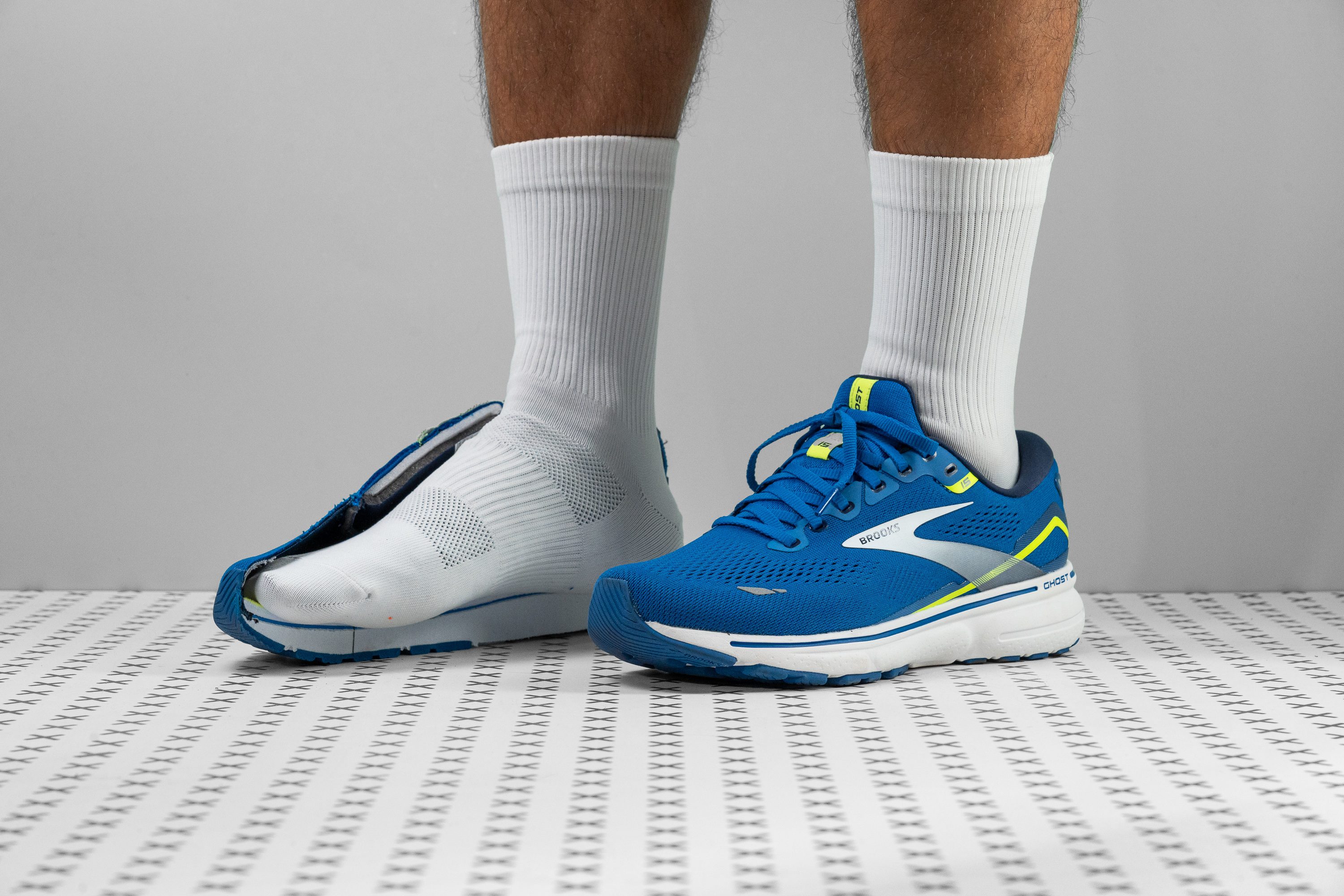Our verdict
- Top pick in best long distance running shoes (2023)
- Top pick in best daily running shoes (2024)
Pros
- Supreme comfort
- Optimized for heel strikers
- No heel slippage
- Great grip in wet conditions
- Built to endure countless miles
- Impressive value for $140
- Great for both running and walking
- Available in up to four different widths
Cons
- Slightly heavier than its predecessor
- Could use some improvements in breathability
- Not a good one for forefoot strikers
Audience verdict
- Top 26% in running shoes for beginners
- Top 11% most popular running shoes
Comparison
The most similar running shoes compared
+ + Add a shoe | |||||
|---|---|---|---|---|---|
| Audience score | 88 Great! | 78 Decent! | 89 Great! | 87 Great! | |
| Price | $140 | $150 | $130 | $140 | |
| Pace | Daily running | Daily running | Daily running | Daily running | |
| Shock absorption | Moderate | High | High | High | |
| Energy return | Low | Low | Low | High | |
| Traction | High | High | Moderate | High | |
| Arch support | Neutral | Neutral | Neutral | Neutral | |
| Weight lab Weight brand | 9.8 oz / 279g 10.1 oz / 286g | 10.2 oz / 289g 10.1 oz / 286g | 9.7 oz / 274g 9.5 oz / 270g | 8.2 oz / 232g 8.3 oz / 235g | |
| Lightweight | ✗ | ✗ | ✗ | ✓ | |
| Drop lab Drop brand | 13.2 mm 12.0 mm | 10.4 mm 10.0 mm | 10.5 mm 5.0 mm | 9.6 mm 5.0 mm | |
| Strike pattern | Heel | Heel | Heel | HeelMid/forefoot | |
| Size | True to size | True to size | True to size | True to size | |
| Midsole softness | Soft | Soft | Soft | Balanced | |
| Difference in midsole softness in cold | Big | Normal | Normal | Big | |
| Toebox durability | Bad | Decent | Bad | Decent | |
| Heel padding durability | Decent | Good | Decent | Bad | |
| Outsole durability | Good | Good | Good | Good | |
| Breathability | Moderate | Moderate | Breathable | Breathable | |
| Width / fit | Narrow | Medium | Medium | Medium | |
| Toebox width | Medium | Narrow | Medium | Narrow | |
| Stiffness | Flexible | Moderate | Moderate | Moderate | |
| Torsional rigidity | Moderate | Moderate | Stiff | Stiff | |
| Heel counter stiffness | Stiff | Stiff | Stiff | Stiff | |
| Rocker | ✗ | ✗ | ✗ | ✓ | |
| Heel lab Heel brand | 36.3 mm 35.0 mm | 36.2 mm 36.5 mm | 40.7 mm 40.0 mm | 36.0 mm 37.0 mm | |
| Forefoot lab Forefoot brand | 23.1 mm 23.0 mm | 25.8 mm 26.5 mm | 30.2 mm 35.0 mm | 26.4 mm 32.0 mm | |
| Widths available | NarrowNormalWideX-Wide | NarrowNormalWideX-Wide | NormalWide | NormalWide | |
| Orthotic friendly | ✓ | ✓ | ✓ | ✓ | |
| Season | All seasons | All seasons | SummerAll seasons | SummerAll seasons | |
| Removable insole | ✓ | ✓ | ✓ | ✓ | |
| Ranking | #239 Top 35% | #343 Bottom 10% | #101 Top 27% | #157 Top 41% | |
| Popularity | #75 Top 11% | #16 Top 5% | #279 Bottom 27% | #15 Top 4% |
Who should buy
The Ghost 15 offers fantastic comfort, and it's a great choice for daily workouts, especially when cruising at slow or moderate speeds.
Moreover, this workhorse from Brooks showcases generous heel cushioning and an ultra-durable outsole, so in our view, it's an ideal match for heel strikers that tend to wear out shoes quickly in that area.
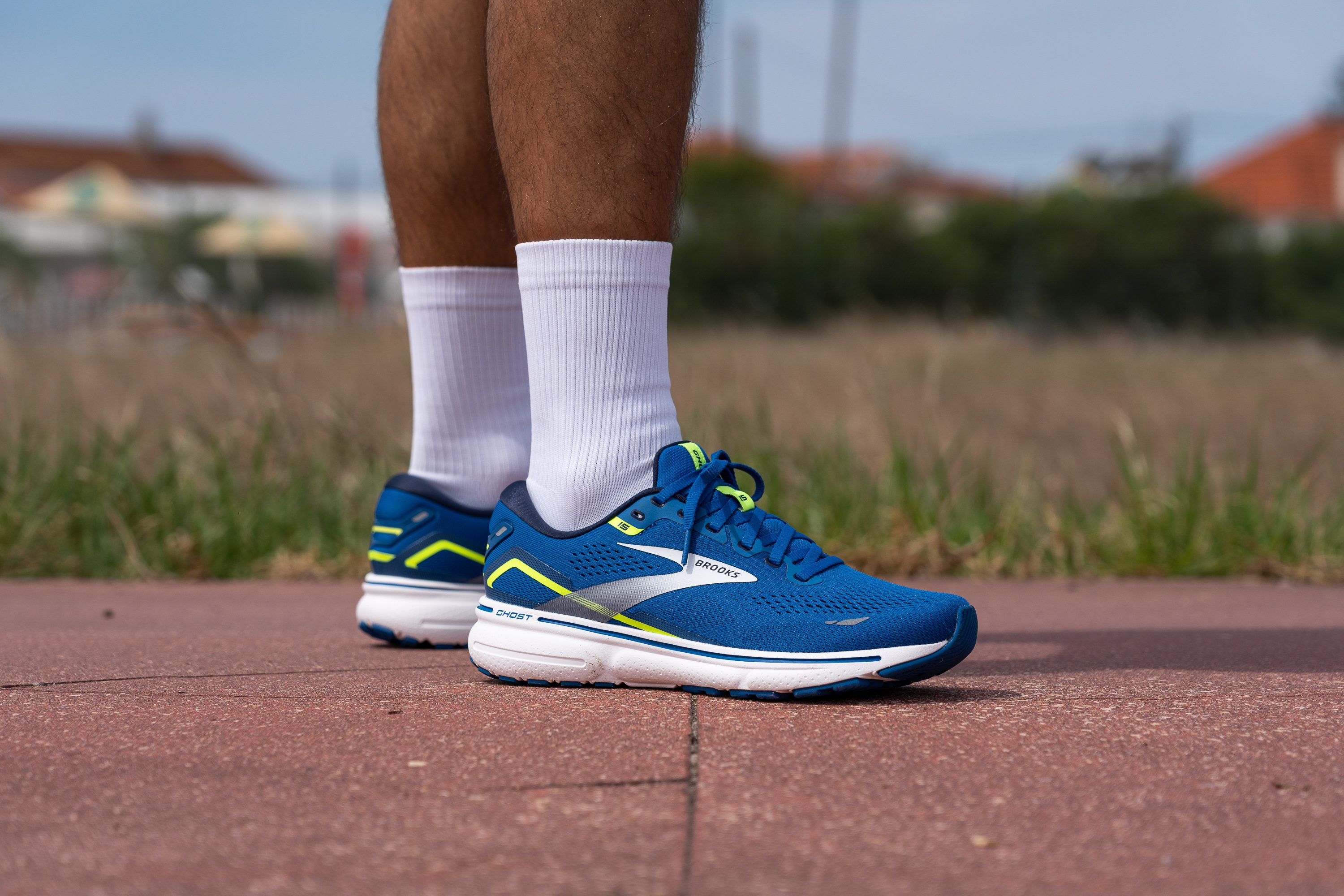
Who should NOT buy
We don't recommend this shoe if you:
- prefer a lighter daily trainer. Check out the Brooks Glycerin 20 instead
- need a stability shoe. The Adrenaline GTS 22 is a better choice in the Brooks lineup
- love high-stacked and plush running shoes. Take a look at the ASICS Nimbus 25 for that
Furthermore, this shoe might not be the best choice for you if you're a forefoot striker. With its CRAZY heel-to-toe drop of 13.2 mm, there's an excess of foam in the heel and insufficient support where you actually hit the ground.
We suggest considering other options such as the Saucony Kinvara 14 or the New Balance Fresh Foam X More v4 instead.
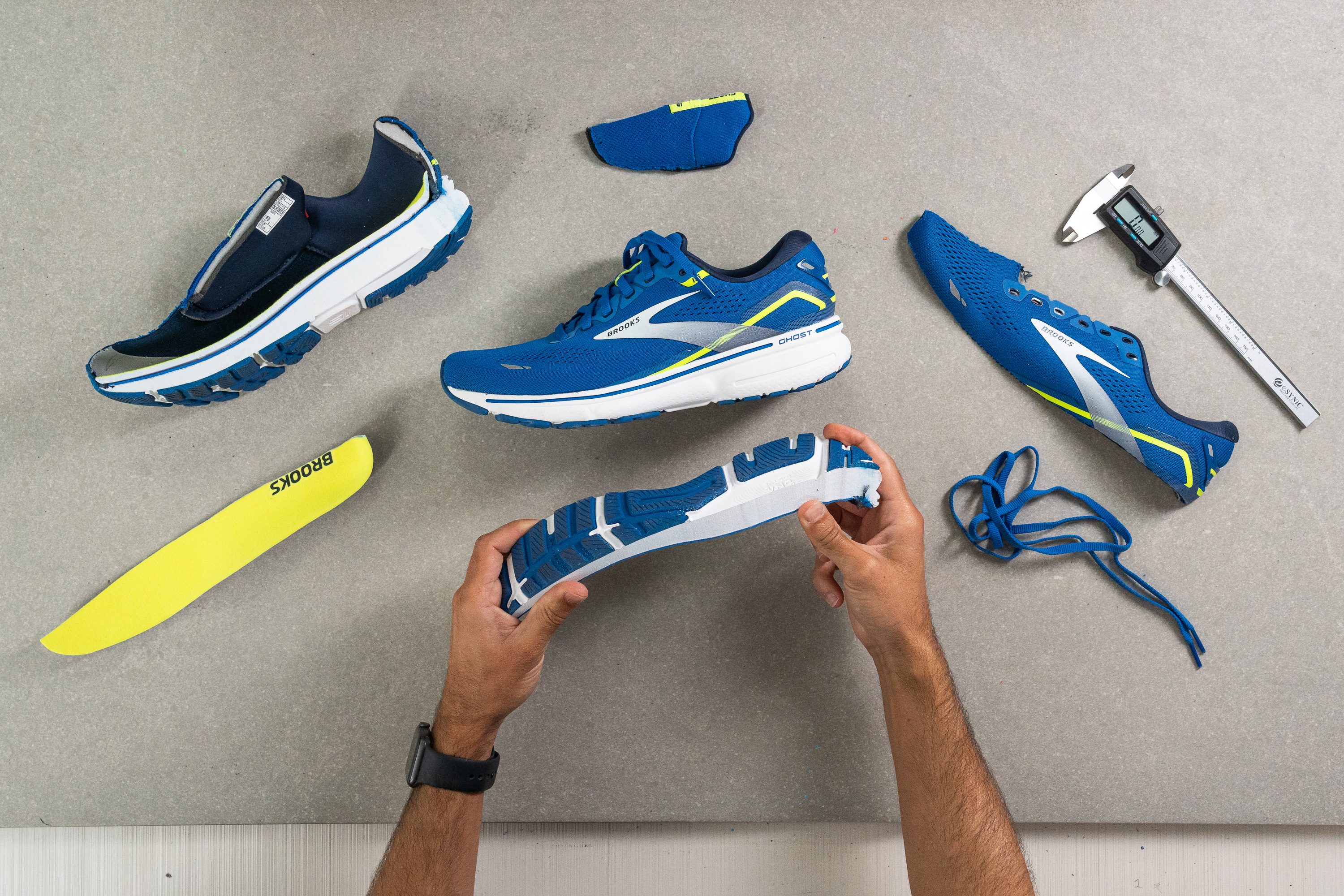
Cushioning
Shock absorption
Daily trainers don’t need to max out on shock absorption, they just need enough protection while staying versatile. That’s exactly where the Ghost 15 lands, with 128 SA in the heel and 91 SA in the forefoot. It’s probably a bit less than we’d like up front, but that’s expected given the shoe’s high drop.
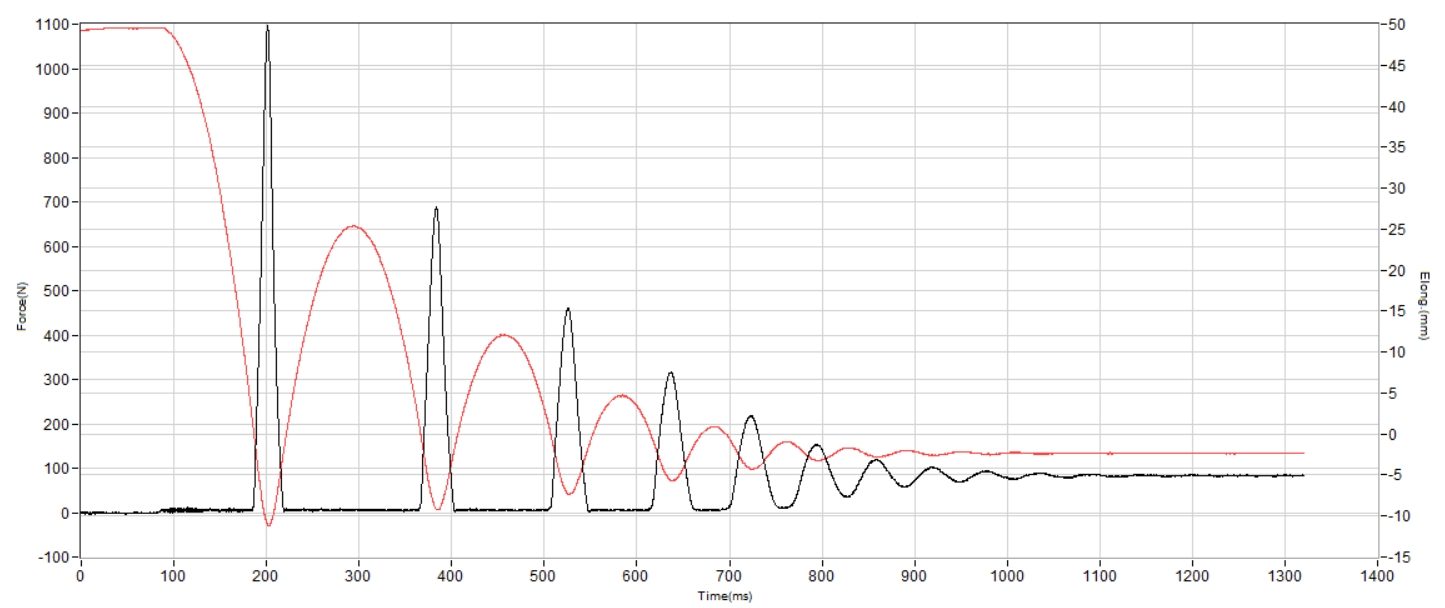
| Ghost 15 | 128 SA |
| Average | 130 SA |
Energy return
The insole of the Ghost 15 features a “Cushion” cloud-like logo that suggests an ultra-bouncy ride, but that’s not the case. We measured a modest 52.5% energy return, placing it on the lower end of the spectrum for modern daily trainers.
| Ghost 15 | 52.5% |
| Average | 58.6% |
Heel stack
Boasting a higher-than-average stack height of 36.3 mm, we're convinced there isn't a heel striker out there who could possibly need more cushioning than this.
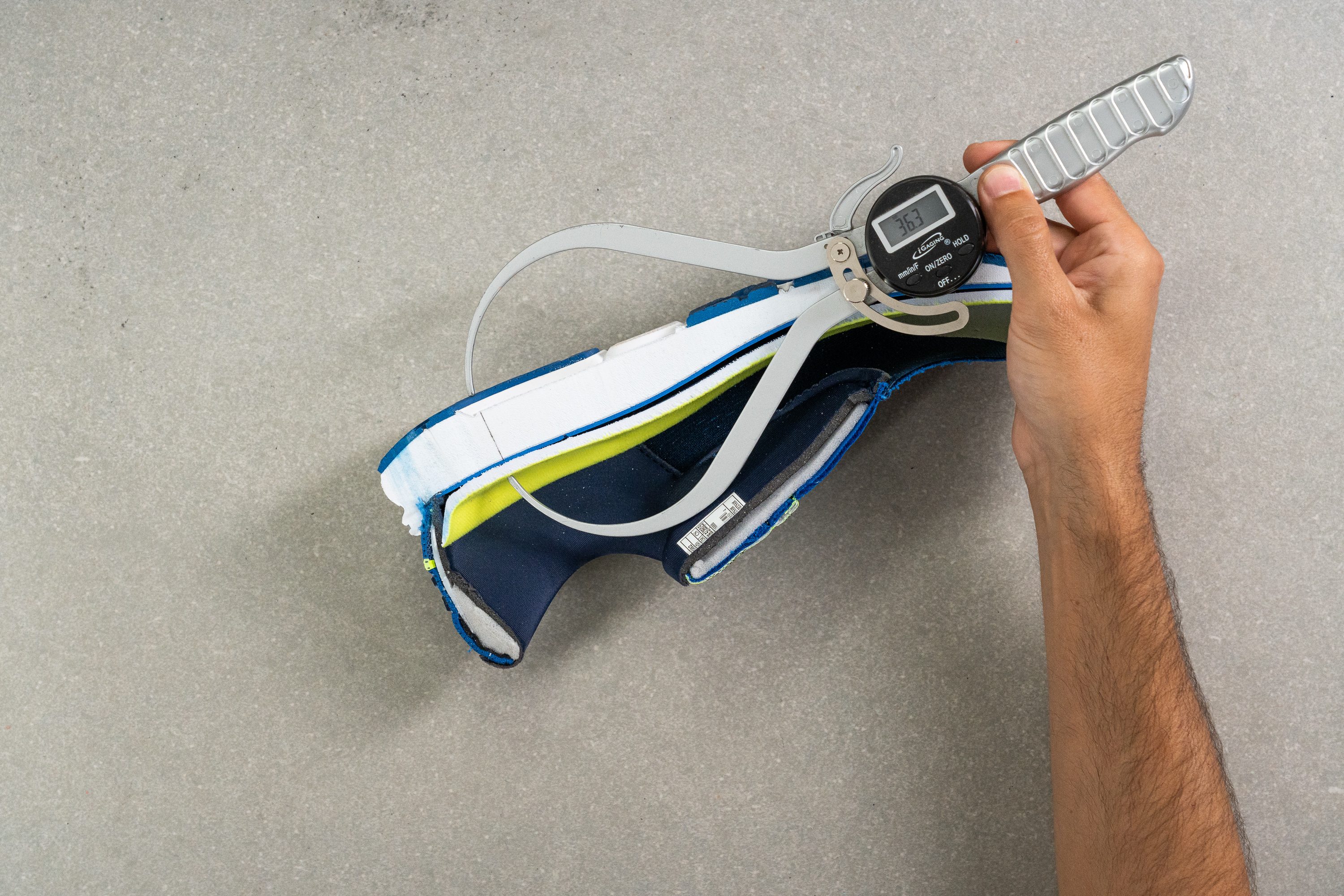
| Ghost 15 | 36.3 mm |
| Average | 34.8 mm |
Forefoot stack
Now, forefoot time. We measured it at 23.1 mm, so it's shy of the typical shoe, though we figure it's more than enough for the majority of runs.
That being said, midfoot or forefoot strikers might find this shoe a tad too slim for their longest runs. In those instances, we recommend adding a high-stack shoe like the Hoka Bondi 8 for those 20-milers.
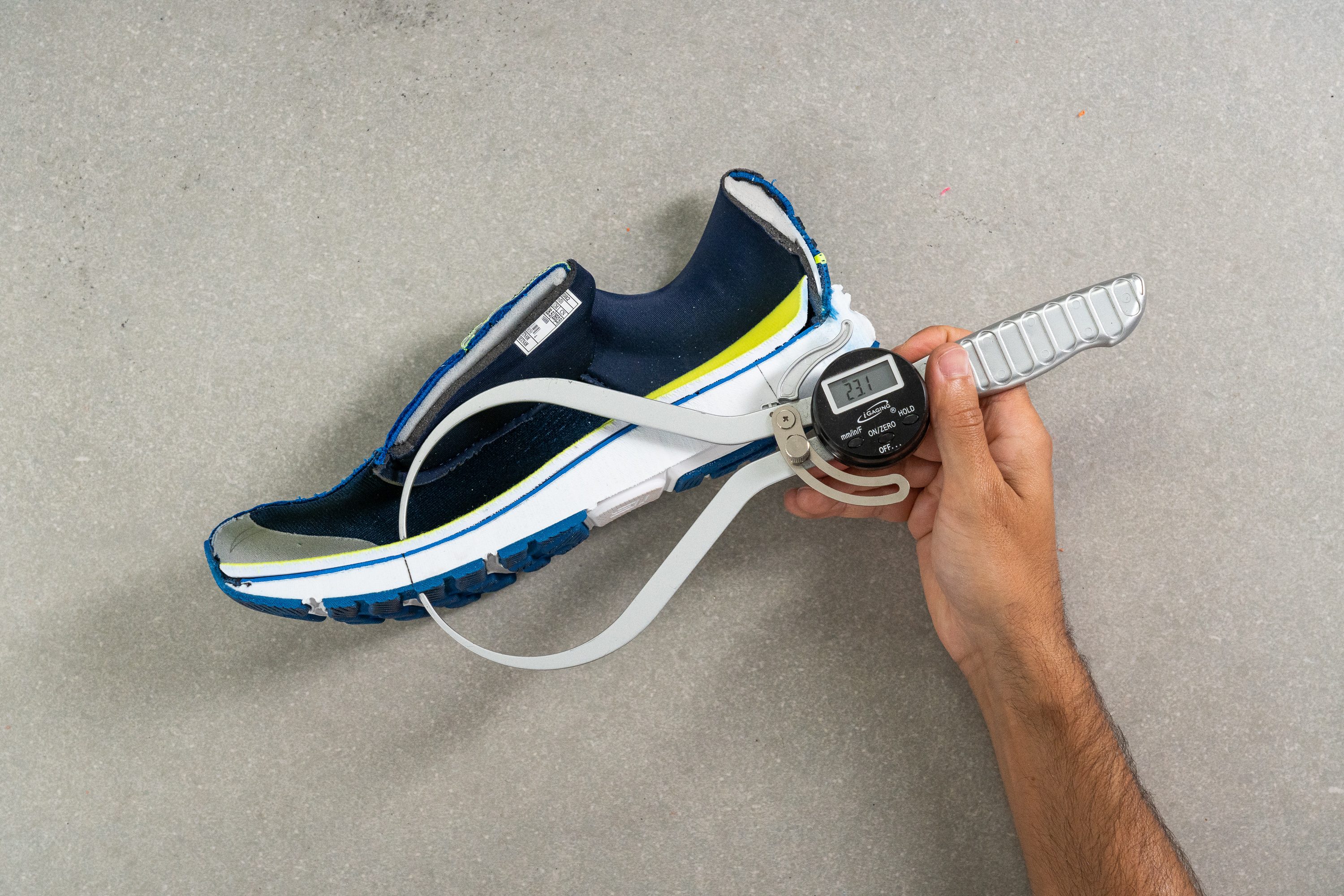
| Ghost 15 | 23.1 mm |
| Average | 26.2 mm |
Drop
Naturally, a skyscraper-high heel and a modest forefoot suggest a two-digit heel-to-toe drop. And there it is—we measured in our lab an eye-popping 13.2 mm, which is nearly 5 mm more than the average shoe and 0.8 mm more than the Brooks Ghost 14.
This shoe is a dream-come-true for heel strikers or those wrestling with Achilles or calf troubles. However, for midfoot or forefoot runners who doesn't suffer with lower-leg problems, we think there are better daily trainers in the market like the Hoka Mach 5.
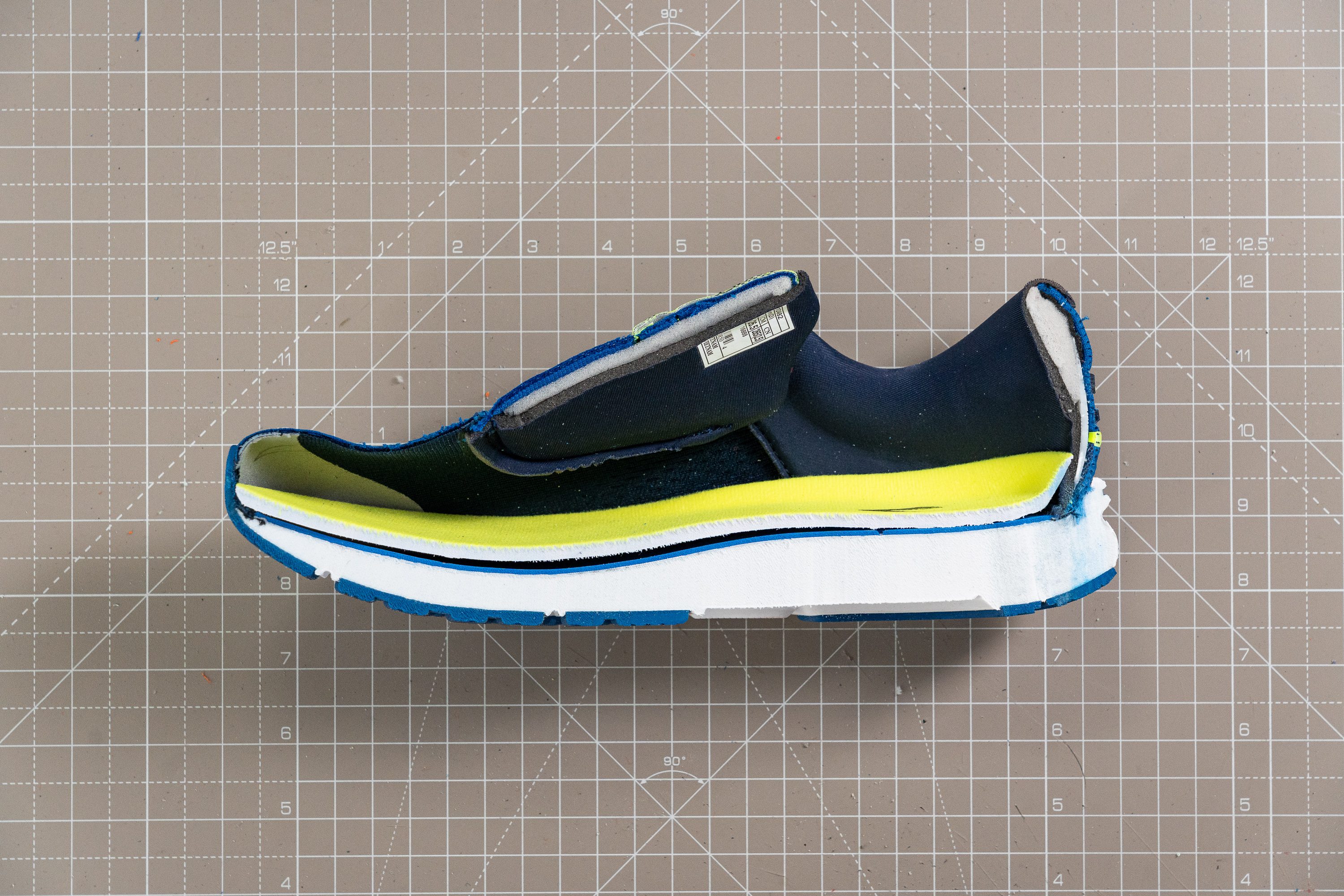
| Ghost 15 | 13.2 mm |
| Average | 8.6 mm |
Midsole softness
Switching gears to the midsole, it hosts DNA Loft v2, a foam made from plain EVA. It's slightly disappointing considering the Glyceryn 20 boasts DNA Loft v3, a nitrogen-infused foam. But at the same time, at 15.9 HA, it's 29% softer than the DNA Loft v1 of its predecessor. Not bad!
And we genuinely enjoyed its ride—it's a blast and one of the softest shoes we've ever tested in the lab.
If you're interested in a deeper dive into midsoles and how do they work, don't hesitate to check our comprehensive guide, it's full of information!
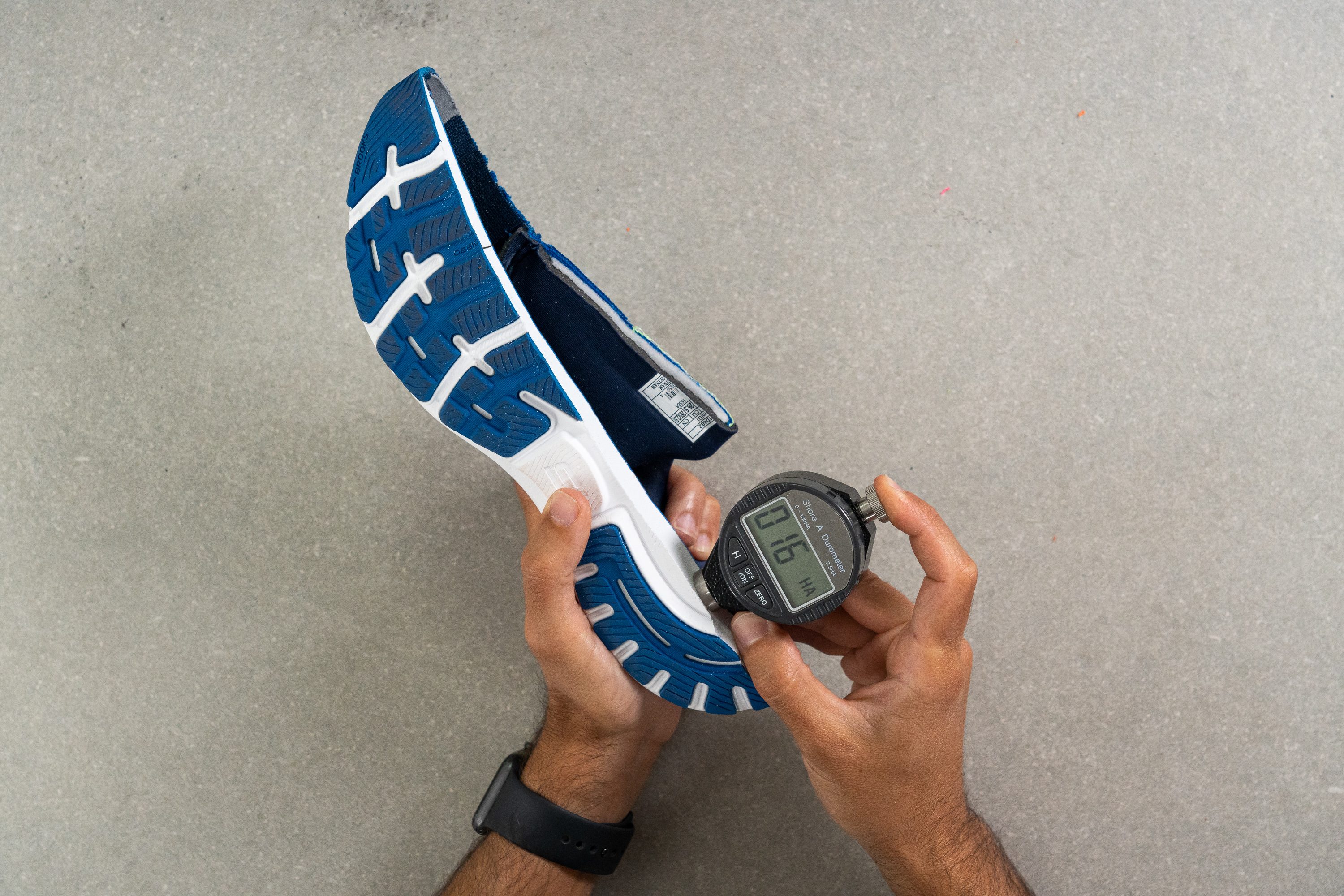
| Ghost 15 | 15.9 HA |
| Average | 20.4 HA |
Size and fit
Size
Brooks Ghost 15 fits true to size (79 votes).
Toebox width - widest part
Brooks clearly understands that this shoe must accommodate a variety of feet. For our medium-to-wide feet, the fit was amazing.
However, the truly exceptional aspect of the guys from Seattle is its renowned tradition of crafting the Ghost in... (drumroll, please...) four sizes!
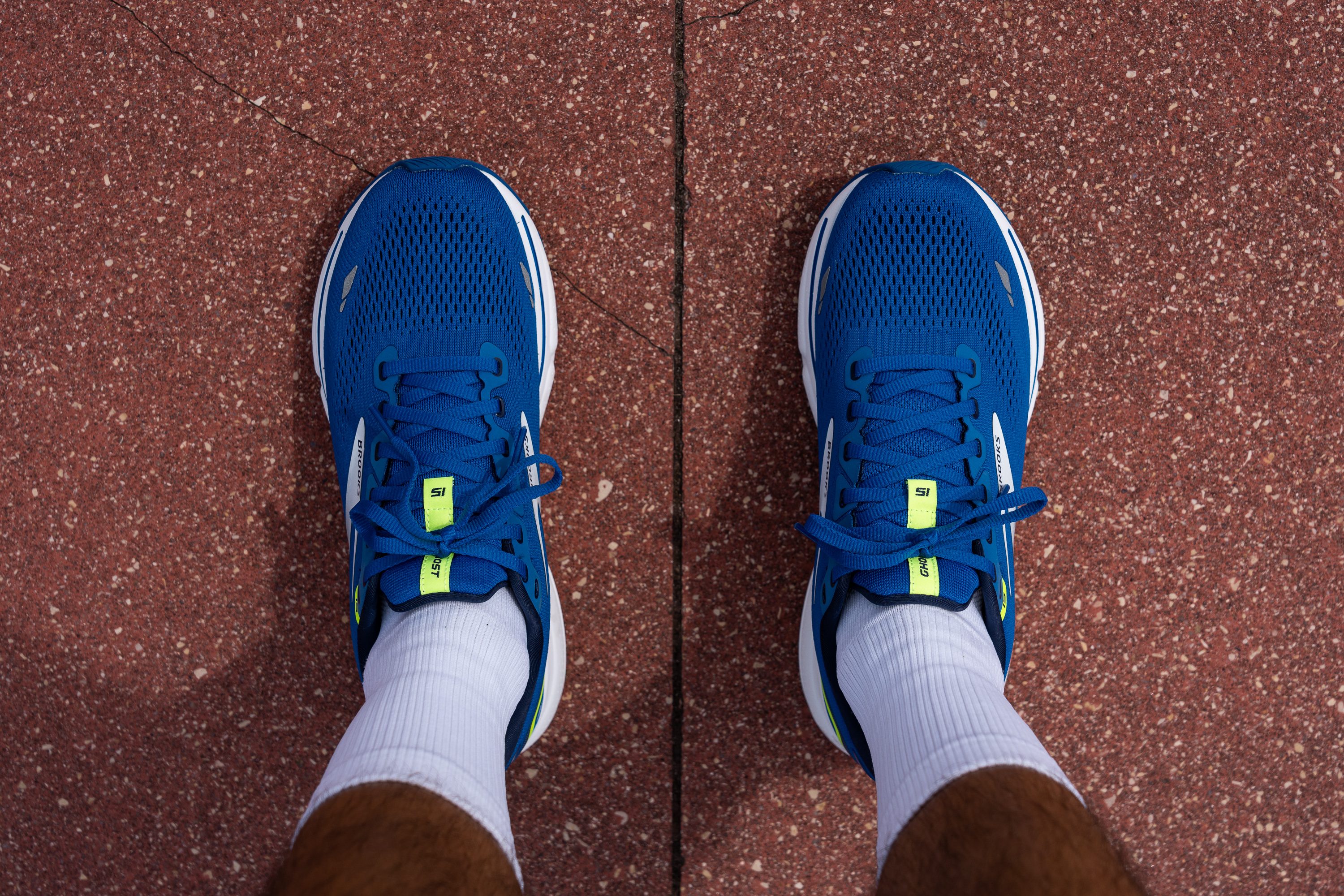
From narrow and medium to wide and extra-wide, their approach makes this one as the "universal" shoe. In fact, only a select few models in the market boast such a range of width options.
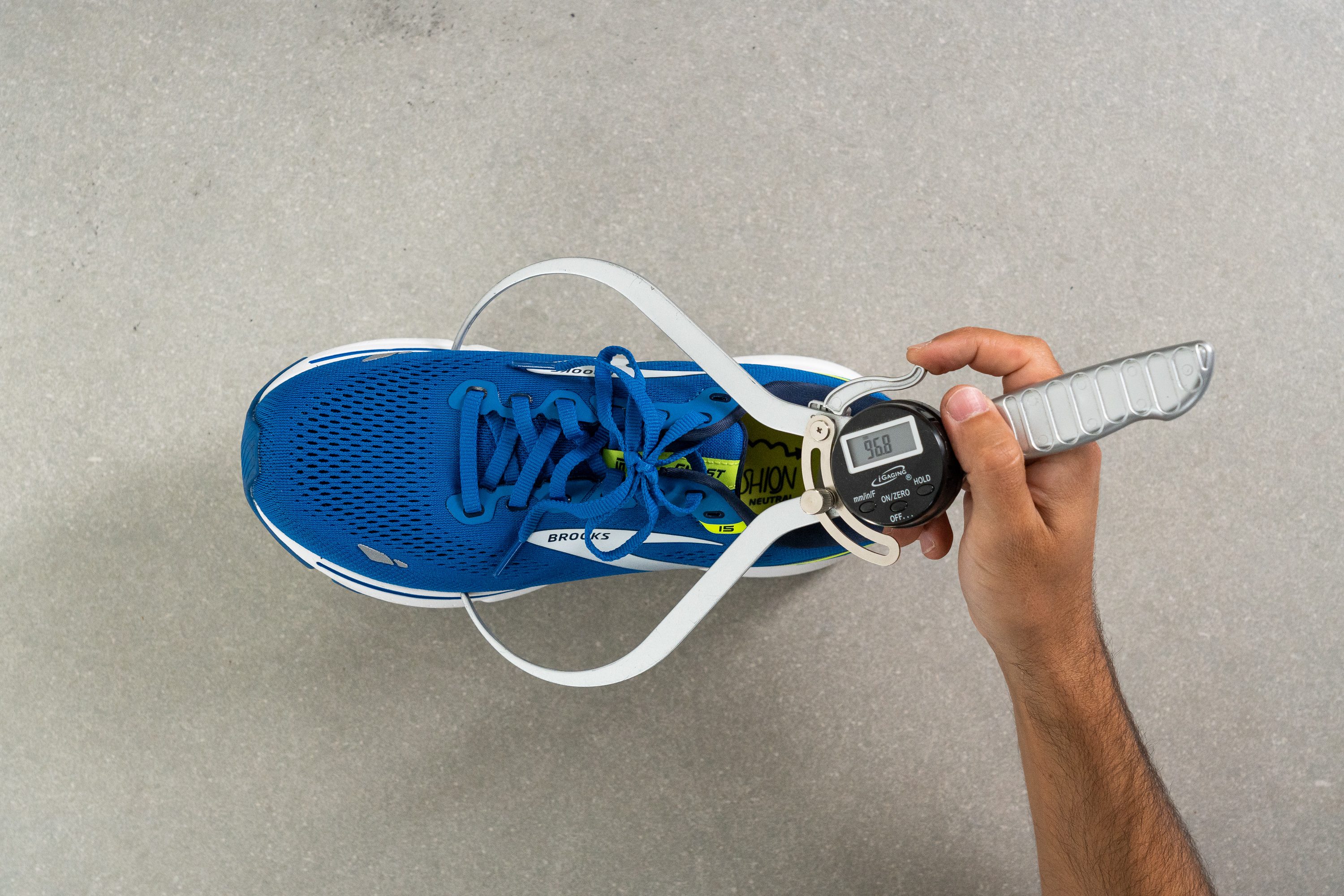
This test follows an older methodology, which is why you don't see recently tested shoes in the chart. Results from different methodologies can not be compared.
| Ghost 15 | 96.8 mm |
| Average | 98.5 mm |
Toebox width - big toe
We've noticed that the area for the big toe is somewhat wider compared to other shoes, which, in our view, is a positive aspect.
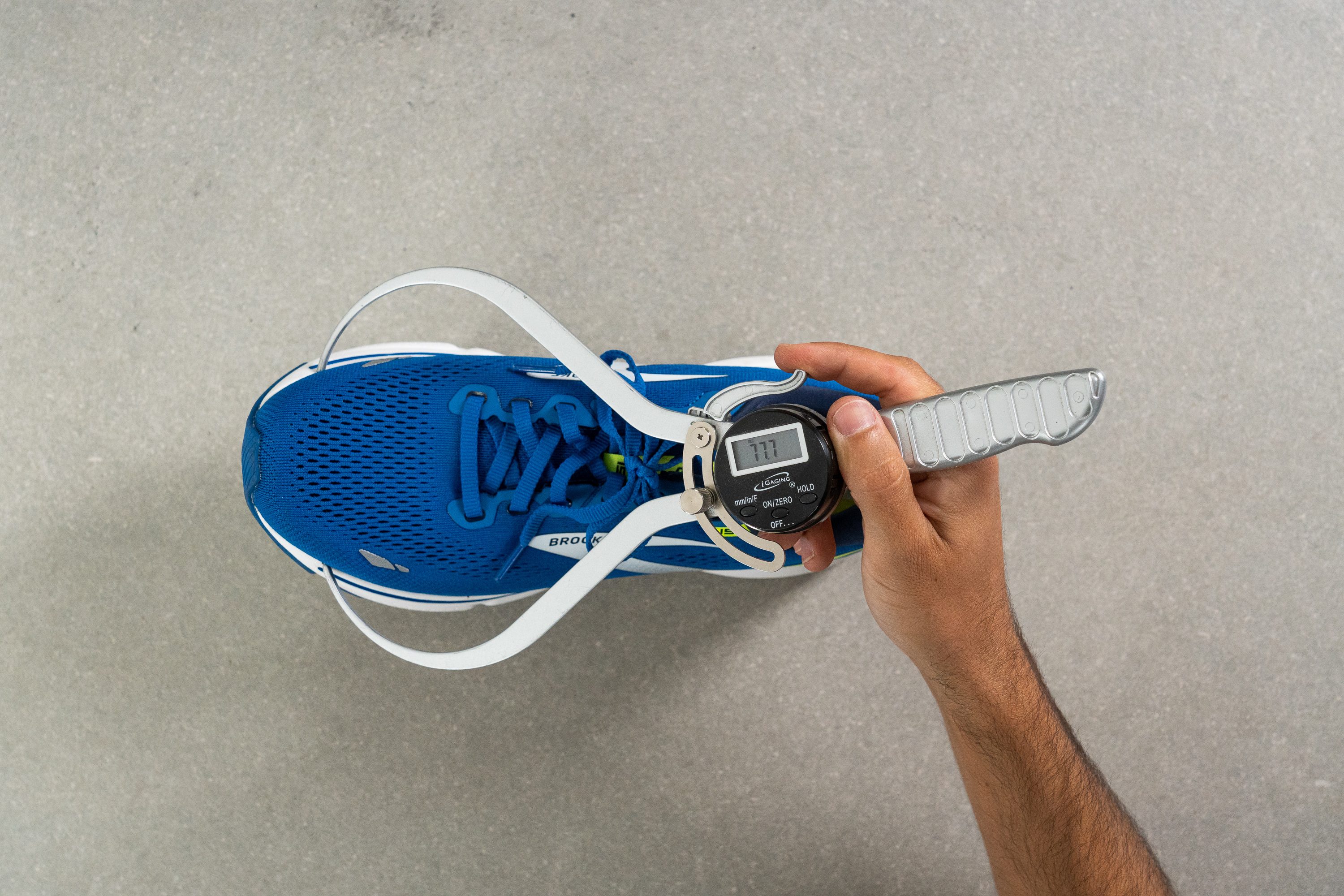
This test follows an older methodology, which is why you don't see recently tested shoes in the chart. Results from different methodologies can not be compared.
| Ghost 15 | 77.7 mm |
| Average | 78.4 mm |
Traction / Grip
Traction test
Adhering to the SATRA TM144 method, we recorded the Ghost 15's friction score at 0.48.
This indicates a solid forefoot grip for a road running shoe and is also consistent with the other Brooks daily trainers we've tested. You can rest assured that it will keep you skid-free on wet pavement.
| Ghost 15 | 0.48 |
| Average | 0.49 |
Outsole design
The Ghost 15 has an outsole that feels nearly identical to other Brooks trainers—as if they copied and pasted the design, adding only small changes like the “15” engraved in the midfoot. Still, much like the rest of the shoe, it follows a safe, no-risk approach with solid rubber coverage that simply gets the job done.
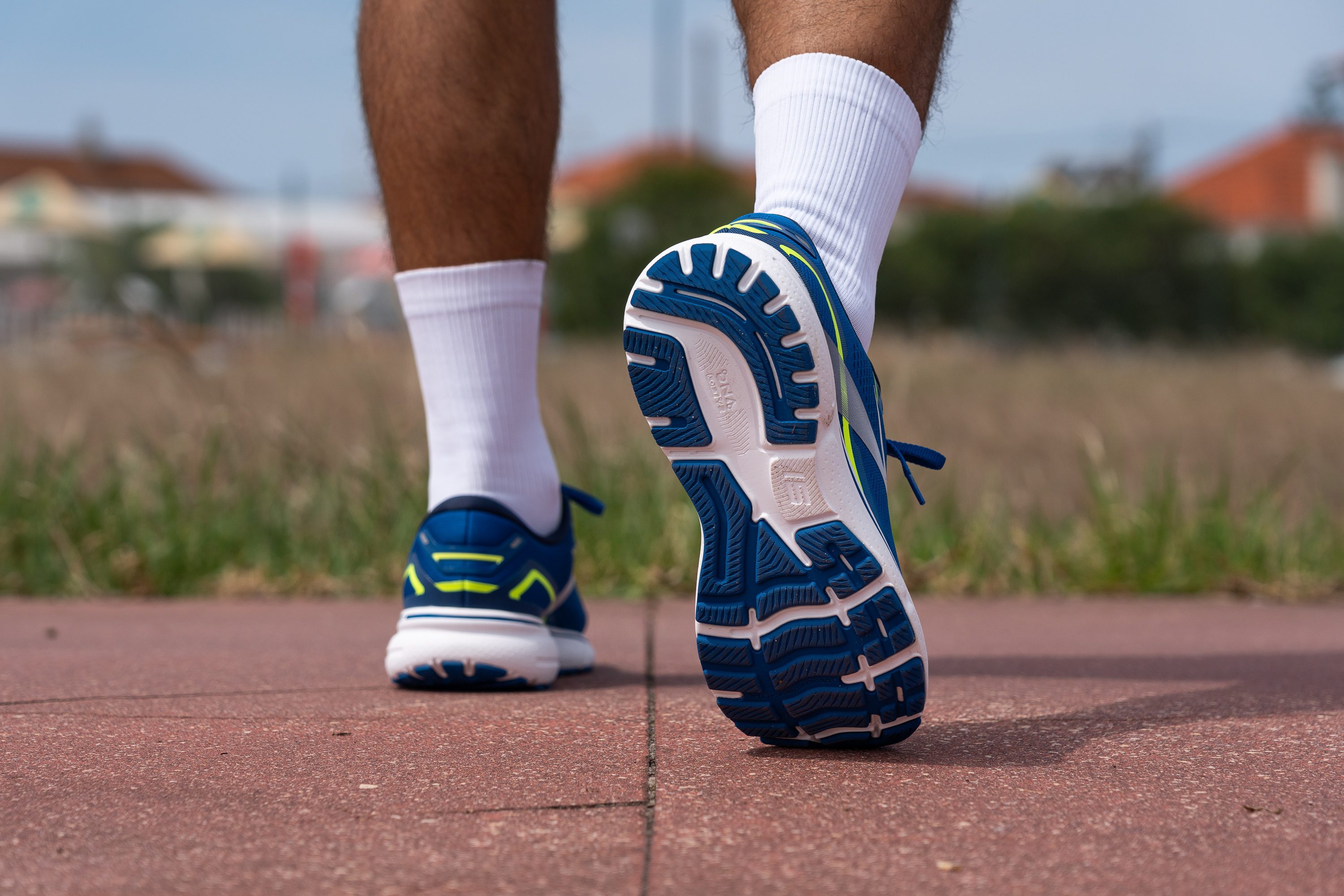
Flexibility / Stiffness
The Ghost series has always been renowned for being one of the more flexible daily trainers on the market. So, for the 15th edition, our stiffness lab test clocked it at just 9.5N.
This measurement is significantly lower compared to the majority of other shoes we've tried!
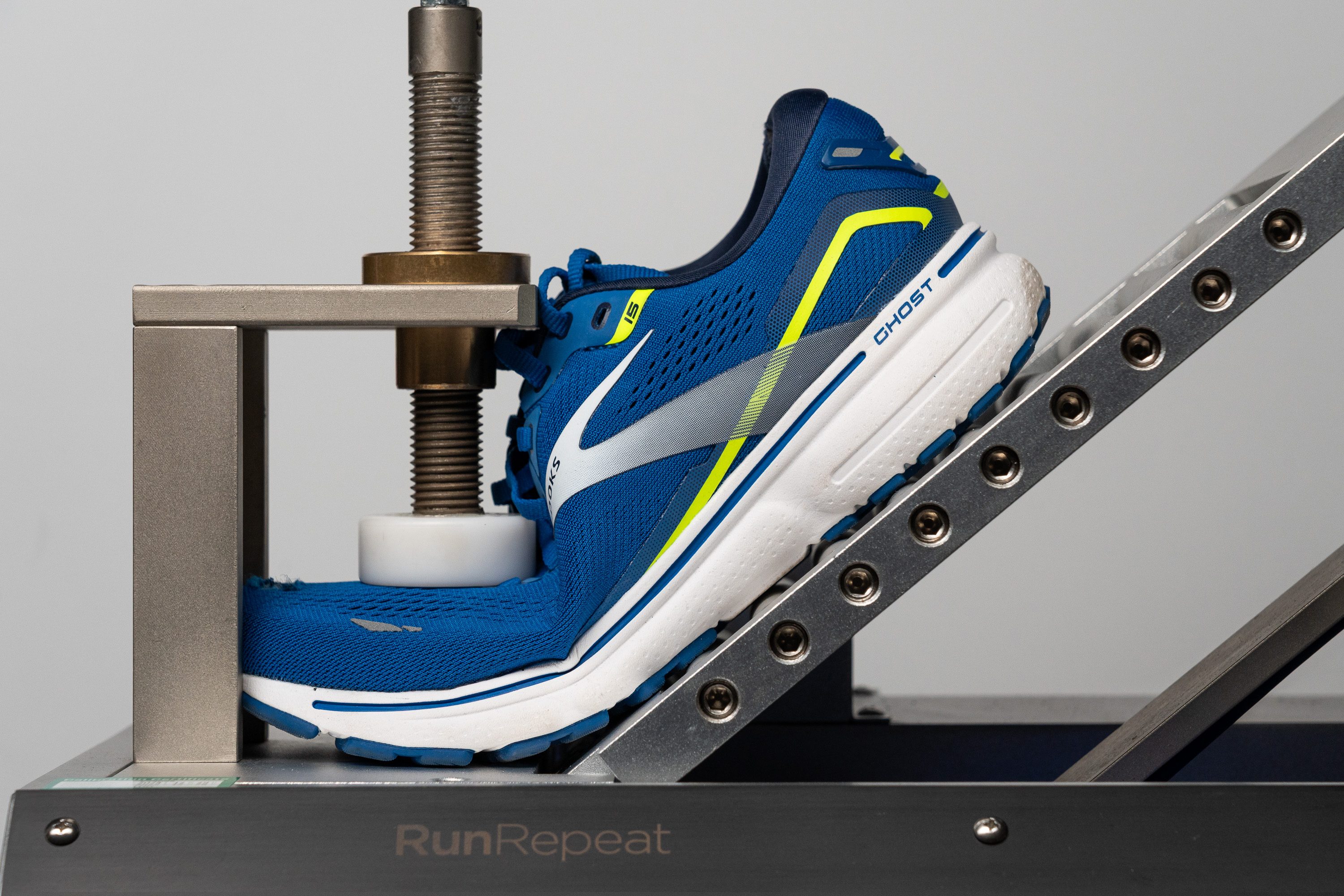
| Ghost 15 | 9.5N |
| Average | 15.3N |
Weight
Weighing in at 9.8 oz (279g), the Ghost 15 just slips under the critical 10 oz threshold, and it's in the same range that most daily trainers—except a few outliers.
| Shoe | Weight (US 9) |
| Brooks Ghost 15 | 279g |
| Nike Pegasus 40 | 275g |
| Saucony Triumph 20 | 282g |
| ASICS Novablast 3 | 242g |
| HOKA Clifton 9 | 249g |
| Nike React Infinity Run Flyknit 3 | 297g |
| Ghost 15 | 9.8 oz (279g) |
| Average | 9.3 oz (264g) |
Breathability
The Brooks Ghost 14 was a great shoe, but the major criticism it got was about its lack of breathability. In fact, we awarded it a 3/5 in our smoke-pumping test, which is a disastrous result for a road running shoe.
Luckily, the Ghost 15 design lead to an improvement in this regard. As evident in the video above, it doesn't quite measure up to the jaw-dropping Saucony Triumph 20 in our lab, but it does surpass its predecessor, earning a commendable 4 out of 5.
Illuminated by our light, we revealed hundreds of well-positioned ventilation holes. And they work great! But what truly captivates us is their distribution—extending beyond the toebox, along the medial part of the shoe.
This feature makes the shoe a top-notch choice for those prone to blisters or similar issues in the arch of the feet. However, you may be thinking right now: if there are hundreds of ventilation holes, why it only achieves a 4 out of 5?
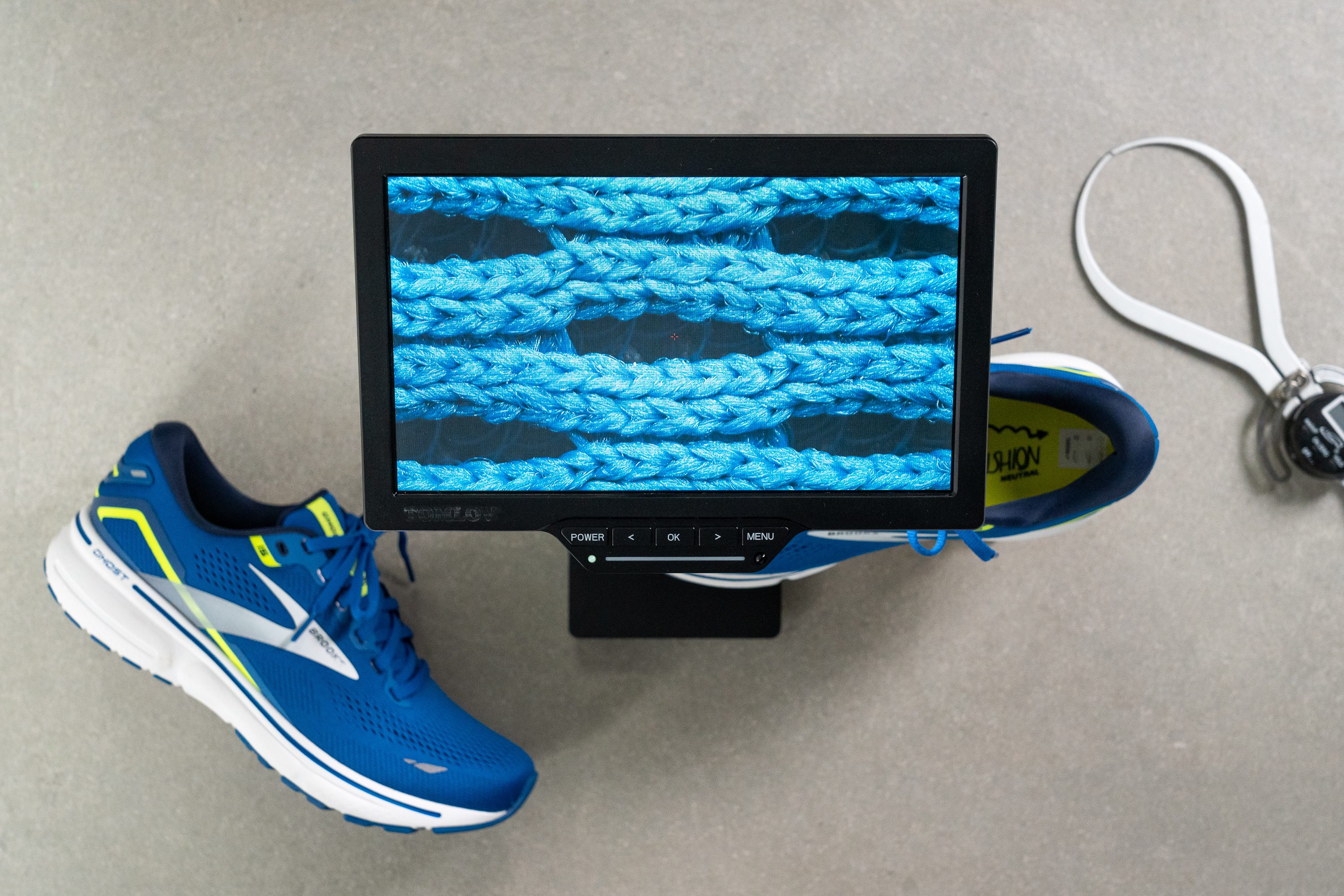
Well, let's uncover the reason. Beneath the ventilation holes lies a thin fabric. This layer enhances comfort but does so at the expense of airflow. Can you see that?
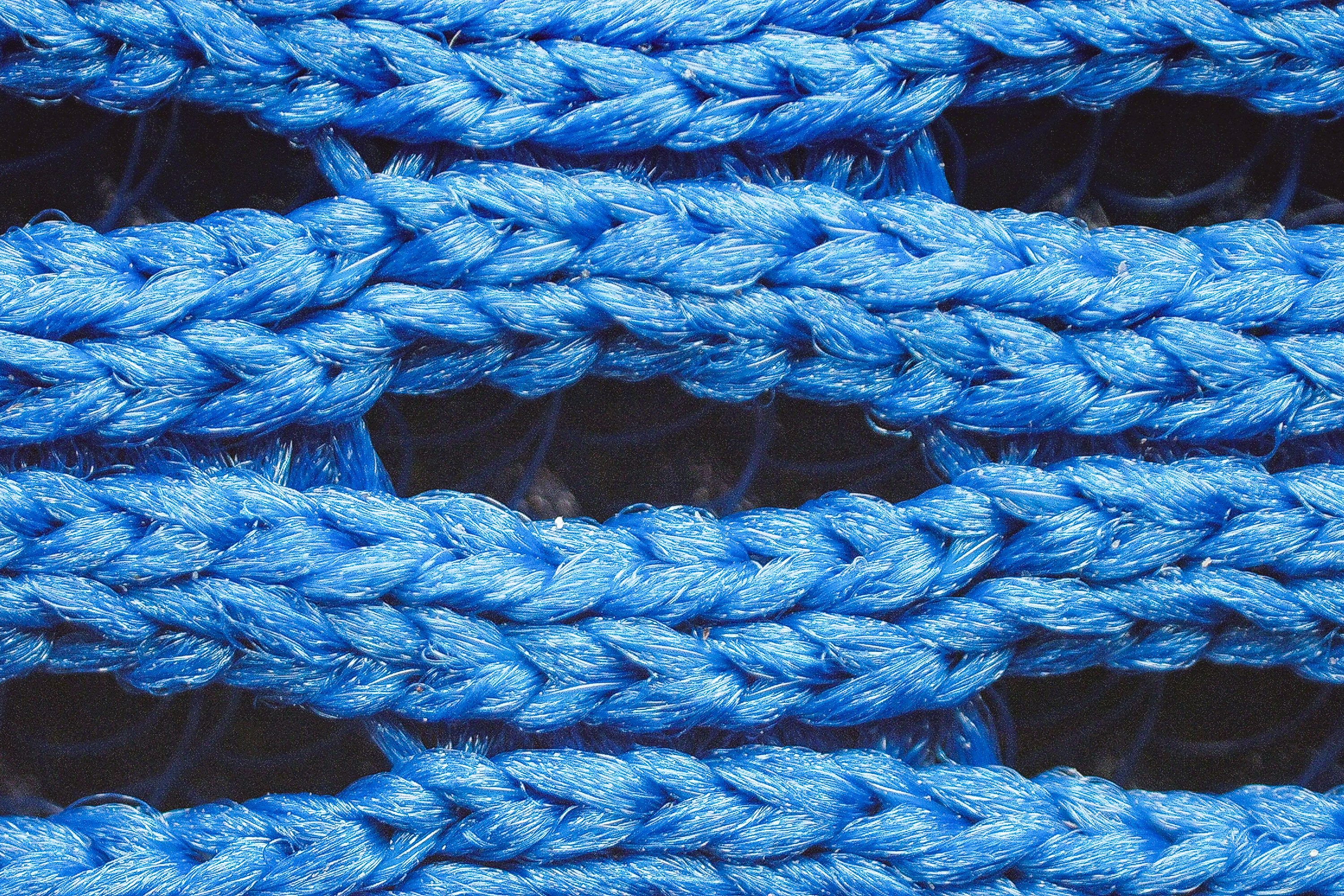
If you're still unsure, there's no better way than dissecting the upper and inspecting it up close. This way, the thin, comfort-enhancing yet airflow-restricting fabric becomes evident.
| Ghost 15 | 4 |
| Average | 3.7 |
Stability
Lateral stability test
Given how soft the foam is in this shoe, we knew this wasn't going to be the most stable option. But to our surprise, it holds up pretty well!
It provided us sufficient stability for the majority of runs, much more than we initially expected.
Torsional rigidity
This stability is because Brooks intentionally designed this shoe to minimize lateral motion.
In our torsional rigidity test, it earned a 3 out of 5 rating—somewhat less than the average shoe but far better than many daily trainers. Take the Nike Pegasus 40 for example, it only managed to score 2 out of 5.
| Ghost 15 | 3 |
| Average | 3.5 |
Heel counter stiffness
The Ghost 15 scored 5/5 on our heel counter stiffness test, meaning it's incredibly rigid in this area. Such a stiff heel counter benefits us by:
- Maintaining our foot alignment and minimizing unnecessary sideways motion.
- Enhancing lockdown and boosting our confidence during quick, tight turns.
However, this advantage doesn't come without trade-offs. The stiffness can lead to discomfort, particularly during runs lasting longer than an hour. This felt for us like too high a price for the stability it provides in those long runs. However, it worked great for us during short easy and aerobic runs.
Indeed, kudos to Brooks for this move, straying from the conventional path rather than following the crowd.
| Ghost 15 | 5 |
| Average | 2.9 |
Midsole width - forefoot
The Ghost 15 it's your run-of-the-mill shoe when it comes to the width of the forefoot, nothing fancy to report. It just does its job, and it does it well.
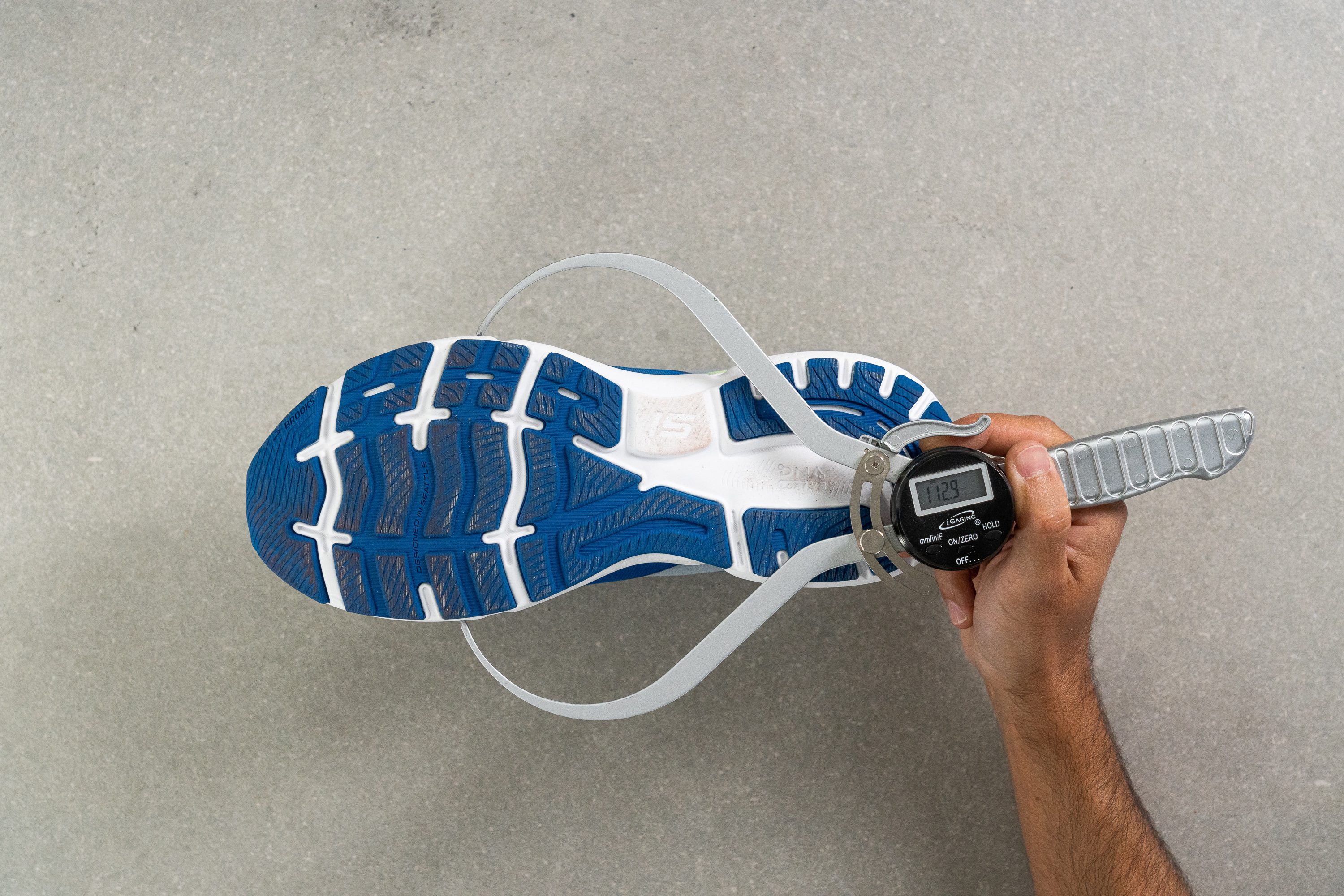
| Ghost 15 | 112.9 mm |
| Average | 114.4 mm |
Midsole width - heel
Brooks had one more stability-enhancing feature up their sleeve. The Ghost 15 sports an impressively wide heel that we measured in the lab at 95.8 mm.
This further convinced us that the shoe designers in Seattle had heel-striking runners firmly in their thoughts when designing this one.
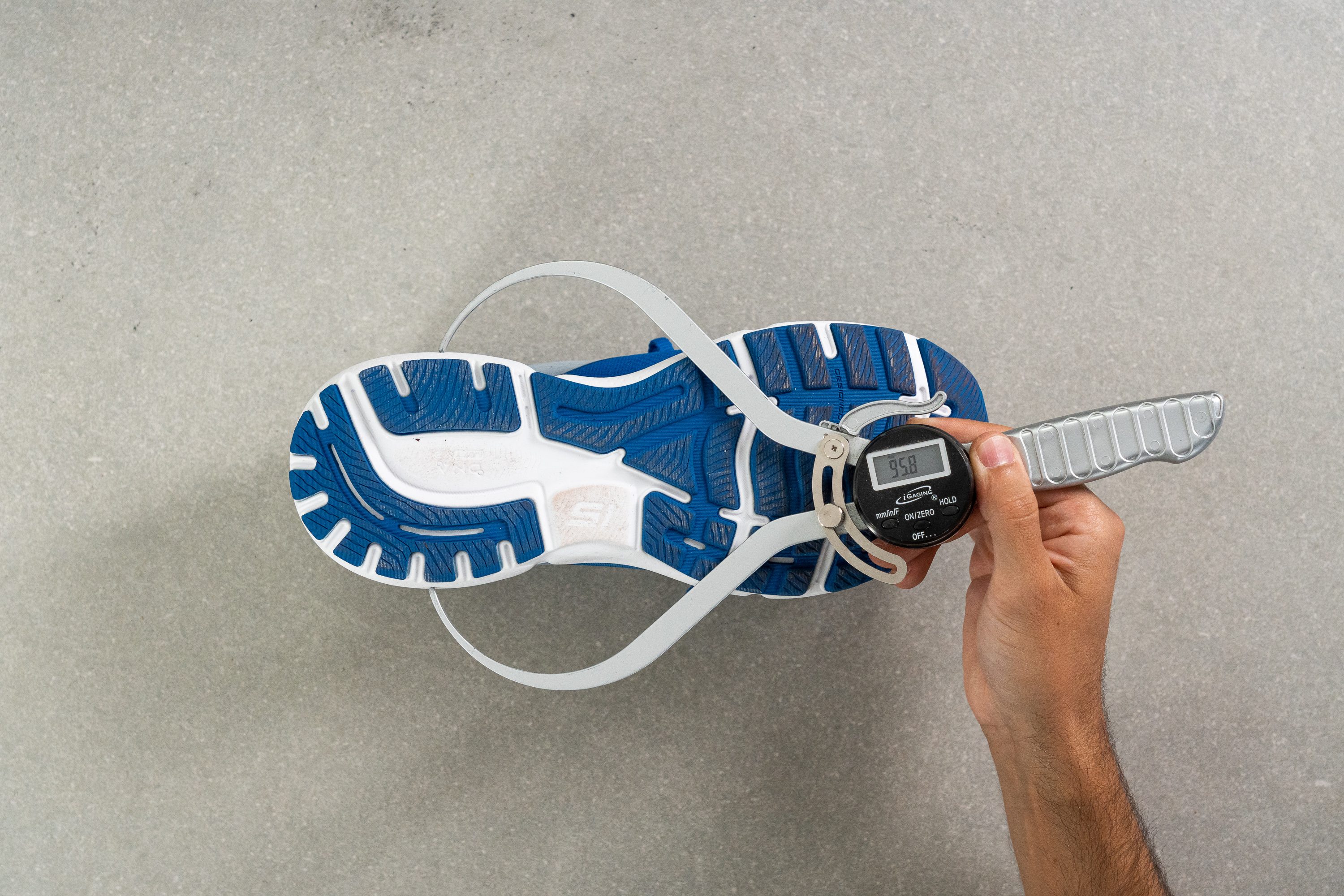
| Ghost 15 | 95.8 mm |
| Average | 90.6 mm |
Durability
Toebox durability
Daily trainers often rank low on the durability scale. Yet, even by these standards, when we subjected this shoe to our Dremel test, it's hard for us to recall a shoe that suffered more damage than this one.
So, don't bank on this shoe for hardcore durability. But for those of us who aren't notorious for wearing out shoes with our big toe or pinky toe, that's not a concern. We should be able to run on roads with them for their full lifespan without a problem.
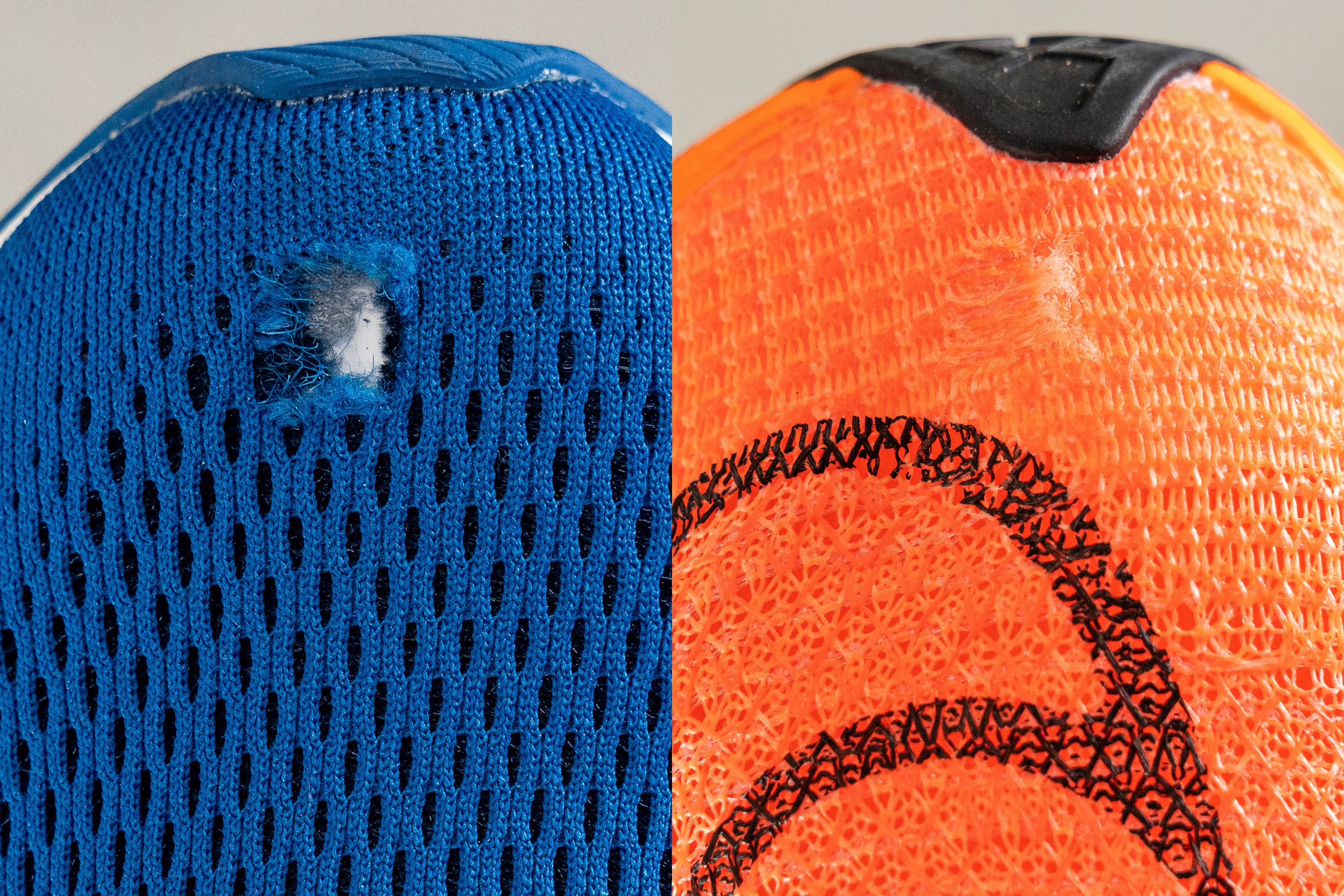
| Ghost 15 | 1 |
| Average | 2.6 |
Heel padding durability
The heel, constructed from a material akin to the toebox, does a slightly improved job, earning a 2/5.
While it's an improvement, it still falls short of our expectations for a $140 shoe, though it outperforms the upper (1/5). The Metaspeed Sky+ (right) easily outperformed the Ghost.
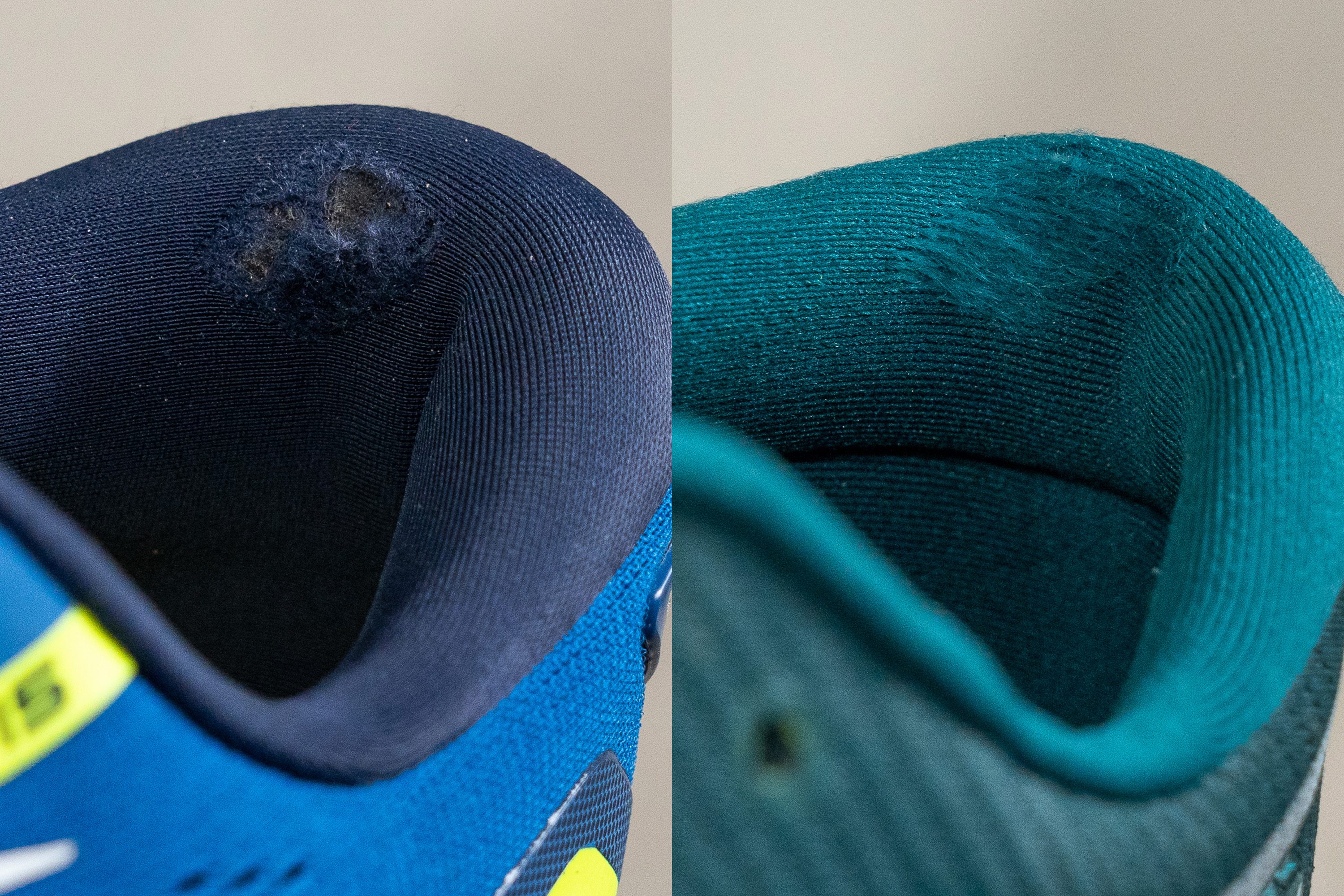
| Ghost 15 | 2 |
| Average | 3.4 |
Outsole durability
And the good news just keeps coming. We pulled out the Dremel again to destroy the rubber, and we received a mind-boggling result.
The tool only erased 0.40 mm of rubber, which leads us to believe this shoe has the long-haul durability to exceed 1000 miles for most runners.
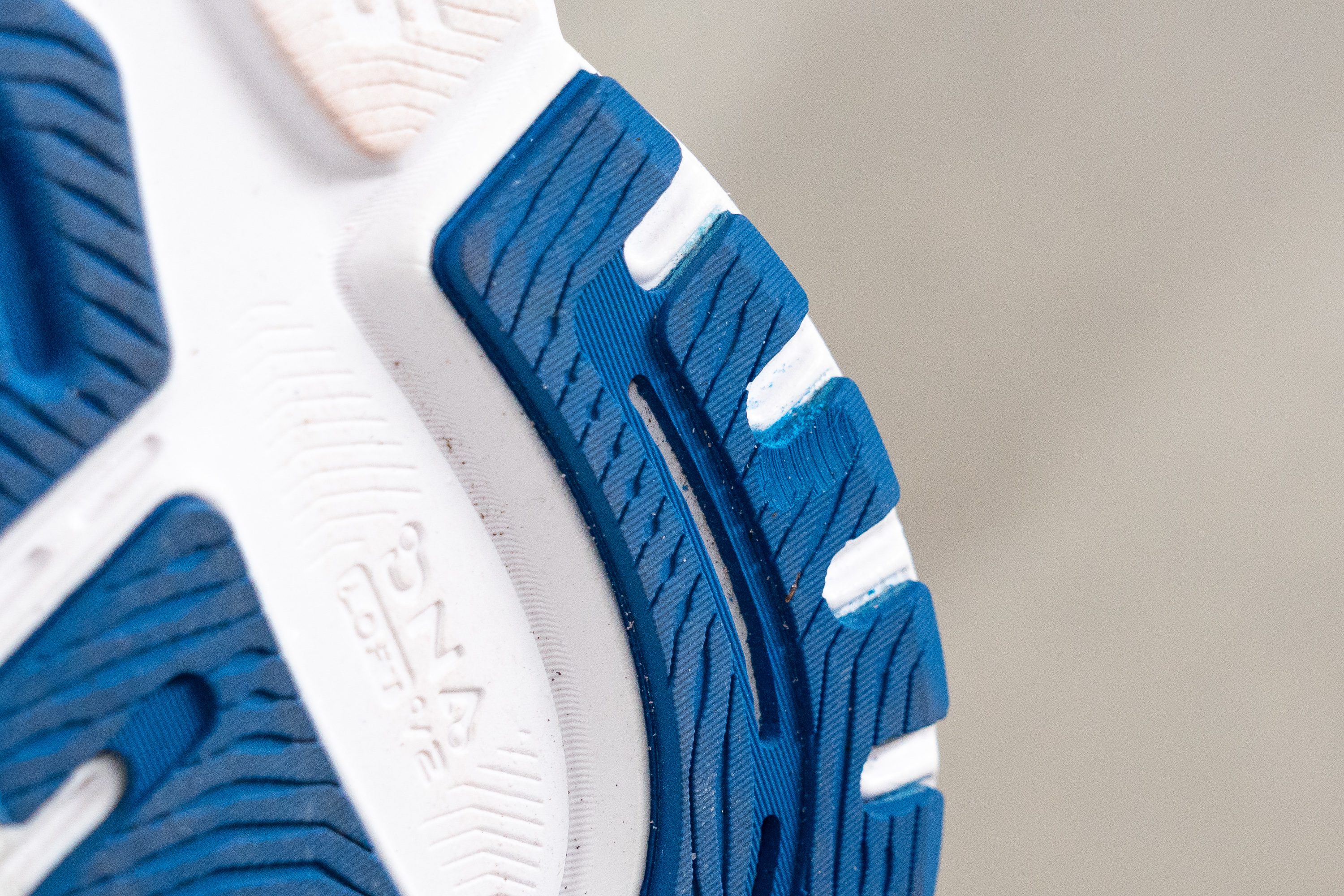
| Ghost 15 | 0.4 mm |
| Average | 1.1 mm |
Outsole thickness
Although the durability displayed by the previous two test was simply amazing, this result falls squarely into the average category. But it's fine!
We genuinely consider a 3.5 mm thickness ample for just about any everyday trainer—except perhaps when running on highly abrasive surfaces.
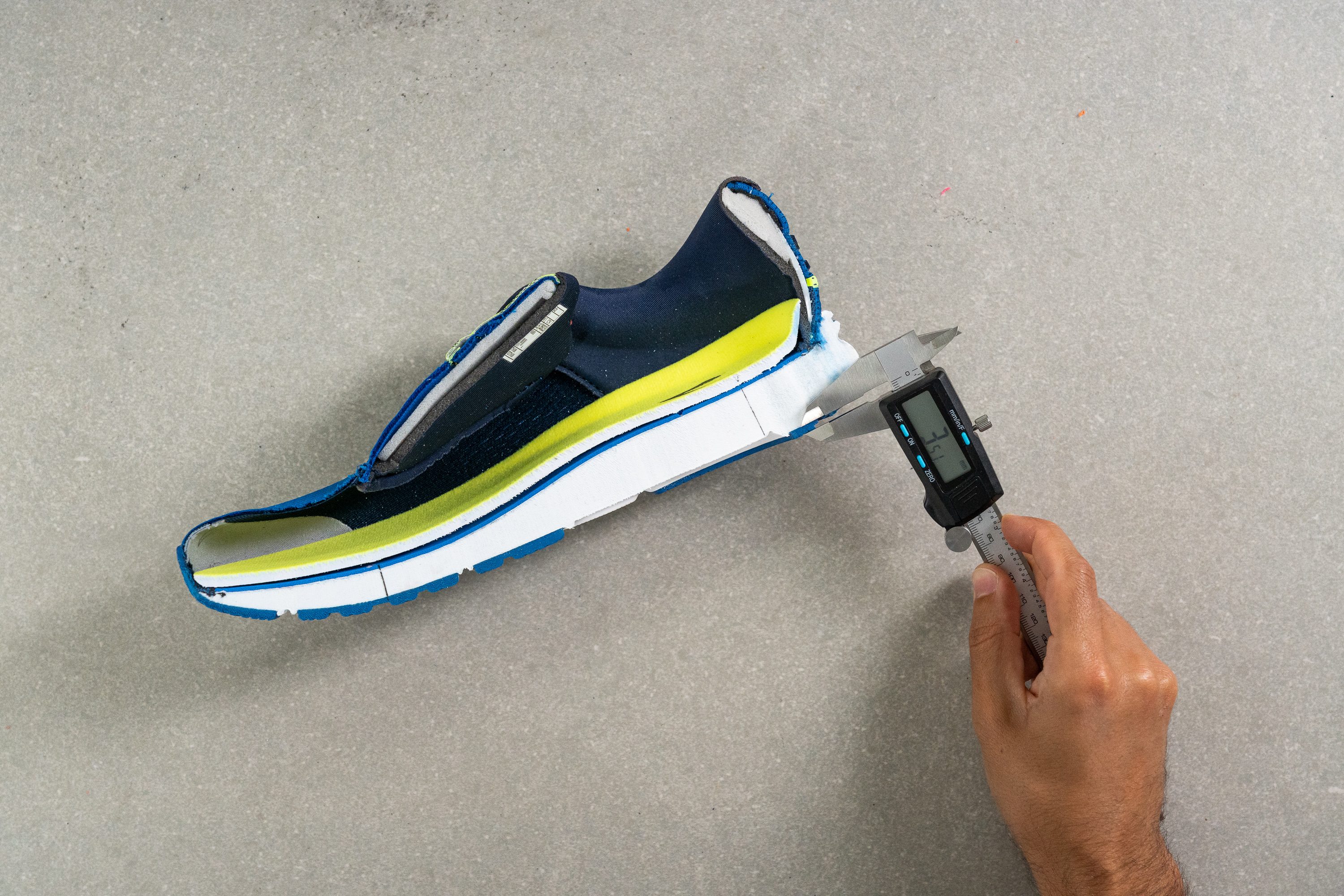
| Ghost 15 | 3.5 mm |
| Average | 3.2 mm |
Misc
Insole thickness
We were anticipating an ordinary insole, and that's exactly what Brooks provided. It's cozy, cushioned, and resilient—everything we need in a daily trainer!
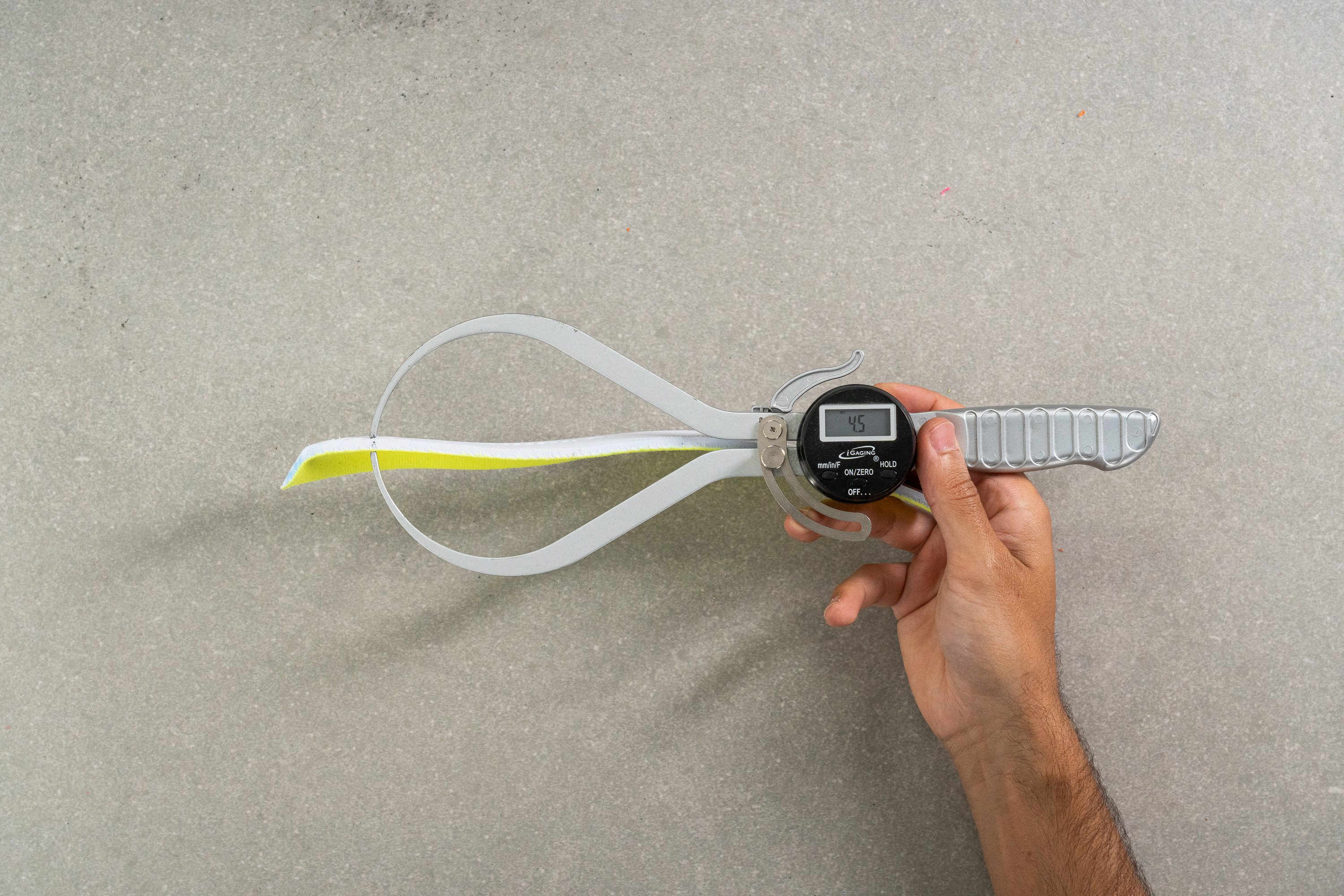
| Ghost 15 | 4.5 mm |
| Average | 4.5 mm |
Removable insole
We successfully managed to remove the insole and insert our own from various other models.
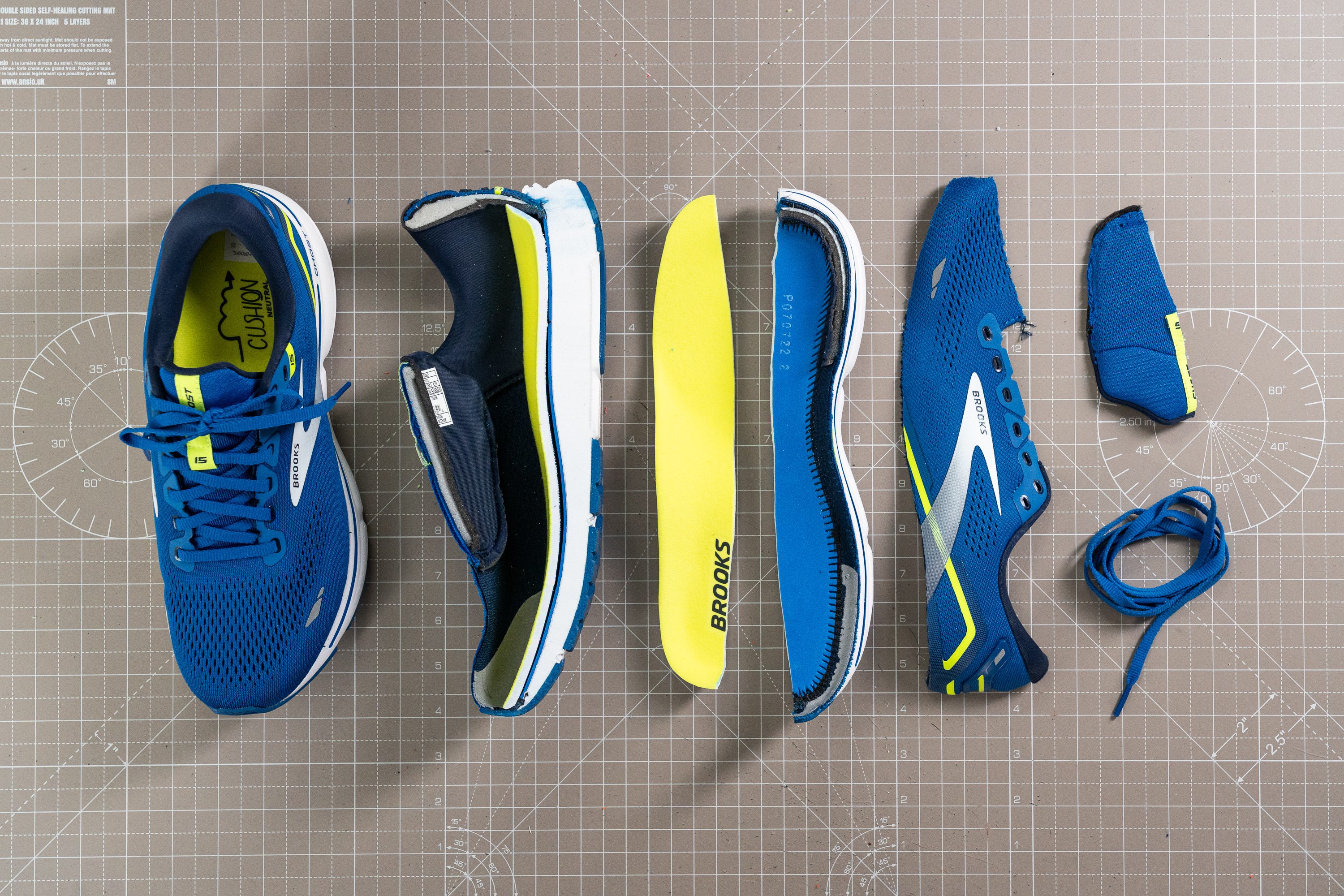
| Ghost 15 | Yes |
Midsole softness in cold (%)
In chilly weather, the midsole keeps its softness, scoring better than the typical shoe with a 24.5 HA rating.
But that's not a great result after all. The midsole gets 54.4% firmer in chily temperatures, which is a letdown.
Still, it's no surprise to us. After testing hundreds of shoes in the lab, we wrote a guide about how EVA foams are infamous for underperforming in Winter.
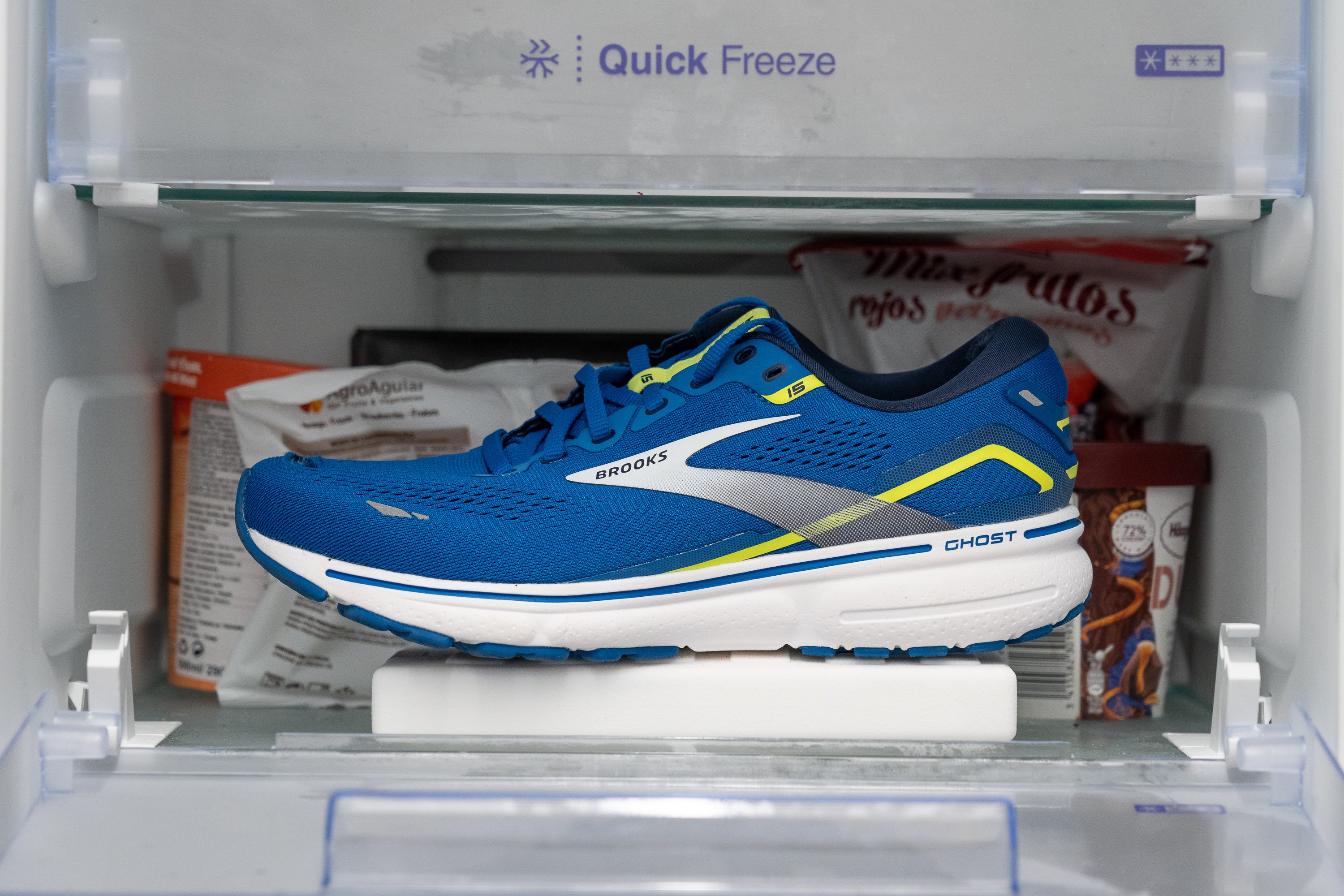
| Ghost 15 | 54% |
| Average | 24% |
Reflective elements
While the Ghost 15 does sport some reflective elements, we find them to be insufficient.
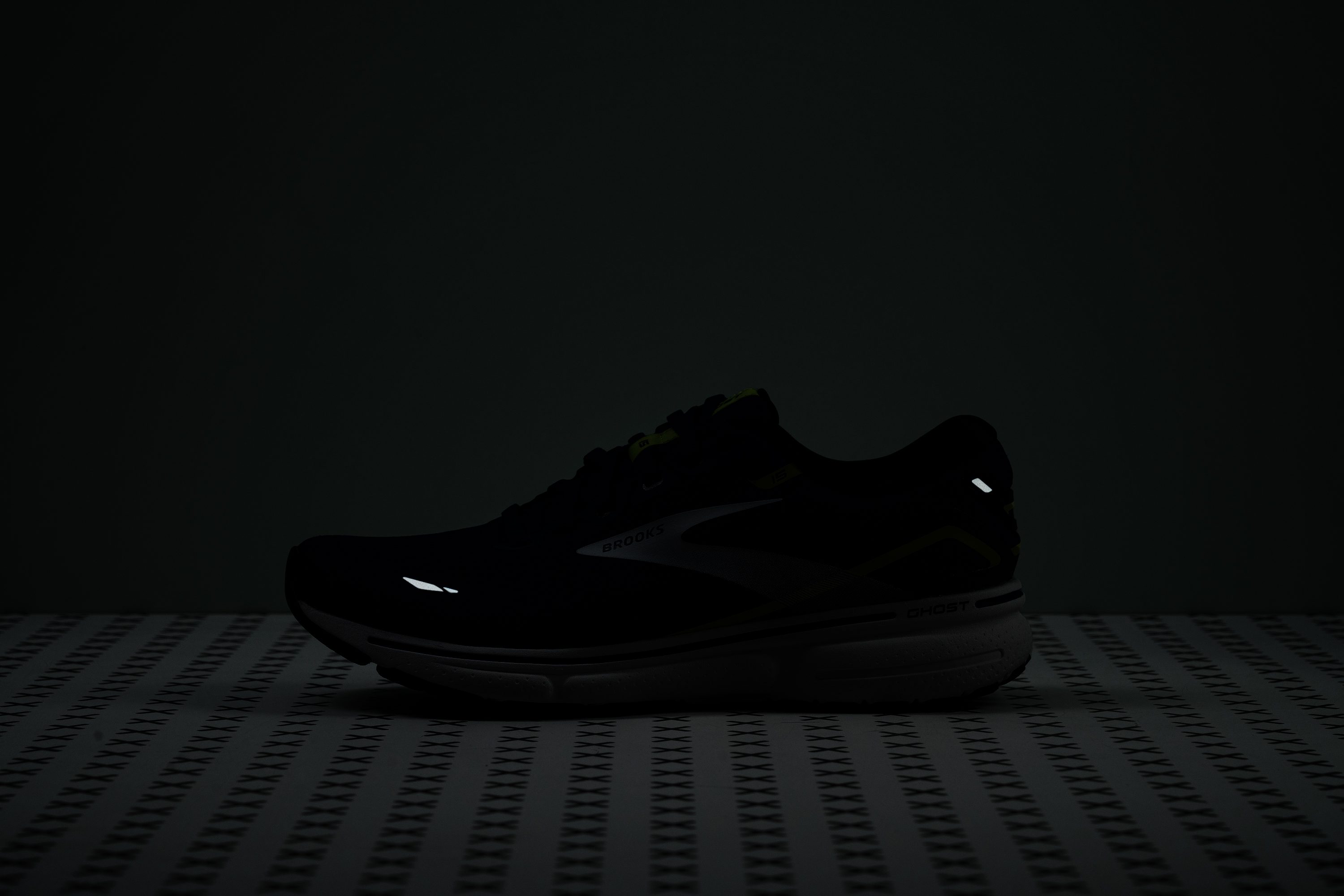
| Ghost 15 | Yes |
Tongue padding
Sure, we're missing out on a gusseted tongue, but the heavenly cushioned padding more than makes up for it. This is one of the thickest tongues we've ever measured!
At 11.4 mm, it's a whopping 41% thicker than its predecessor and an impressive, plus 2x the average shoe.
In fact, they've used two separate pieces of plush foam in the tongue, a rare approach to attain this level of thickness.
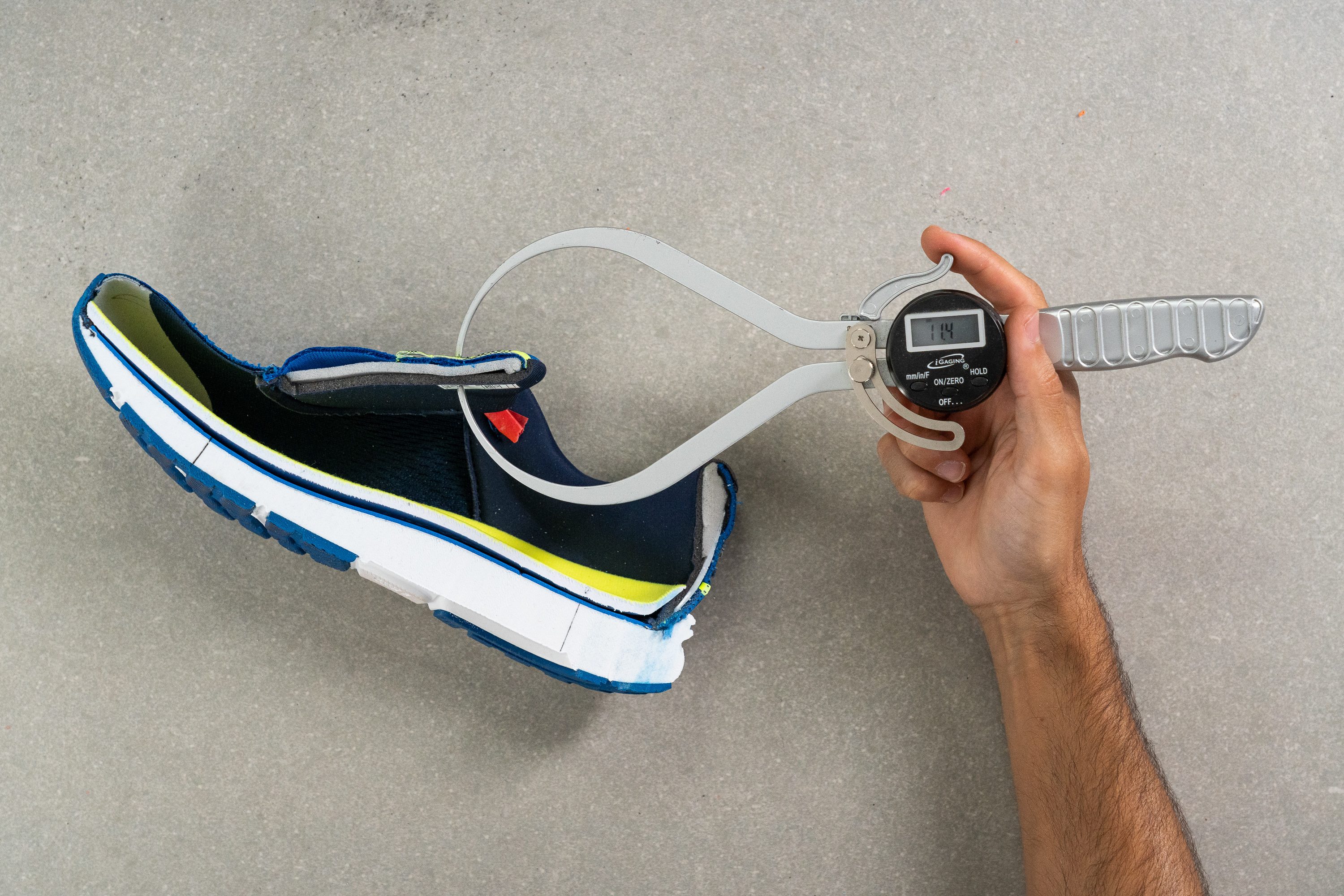
| Ghost 15 | 11.4 mm |
| Average | 5.7 mm |
Tongue: gusset type
Regrettably, there's one tradition they persist with that doesn't quite meet our expectations—the absence of gusset.
It would be great to see the Ghost equipped with a semi-gusseted tongue for enhanced lockdown, but it looks like we'll be keeping our fingers crossed until at least the 16th iteration.
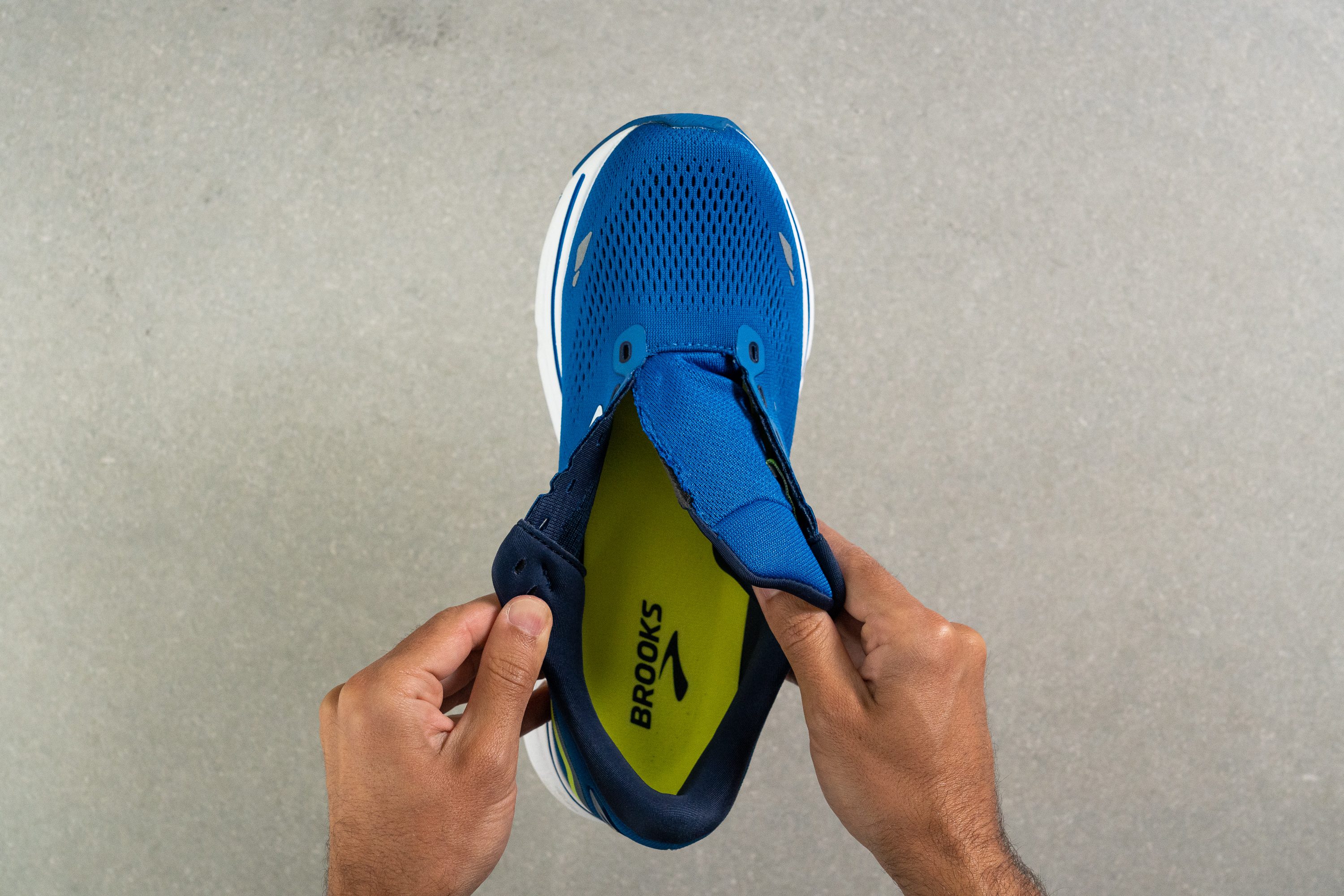
| Ghost 15 | None |

